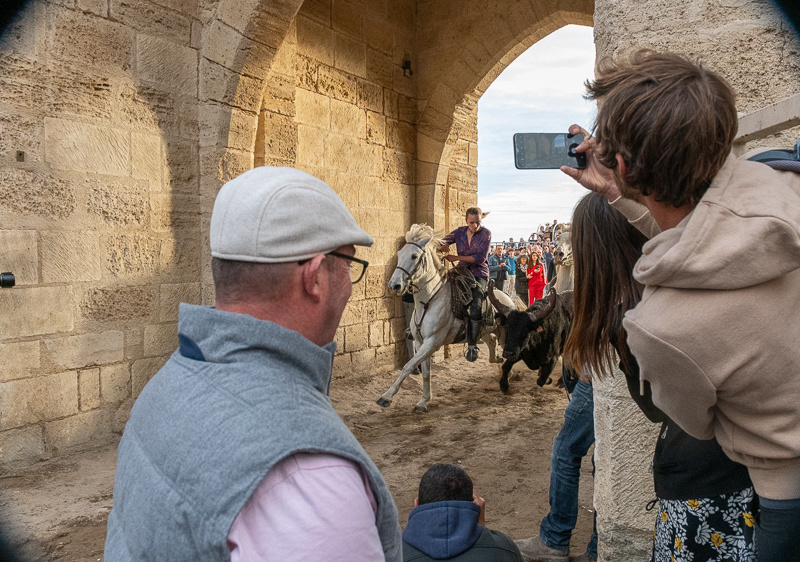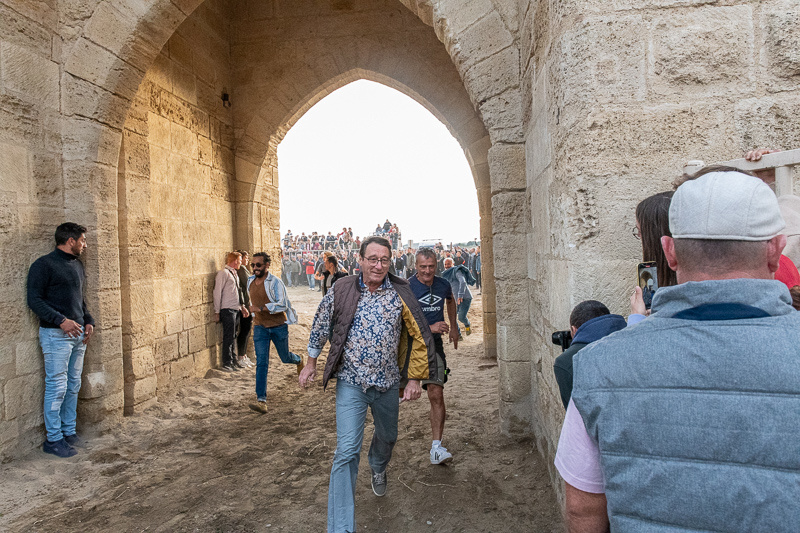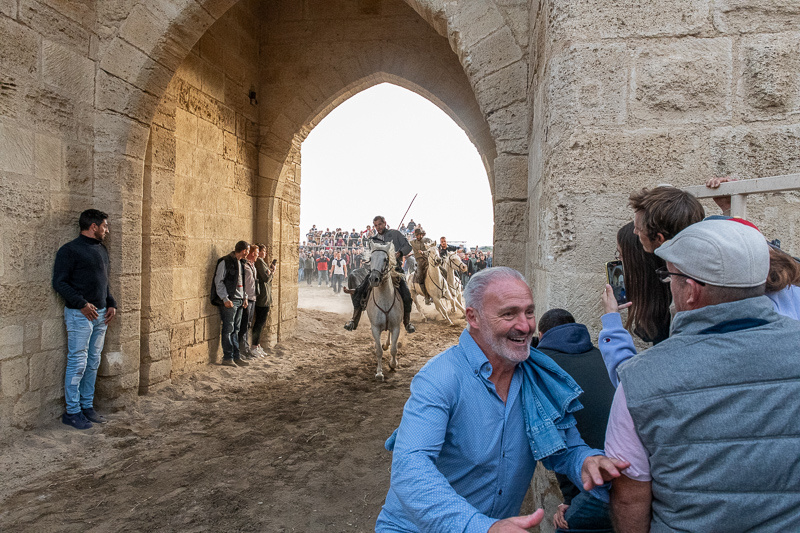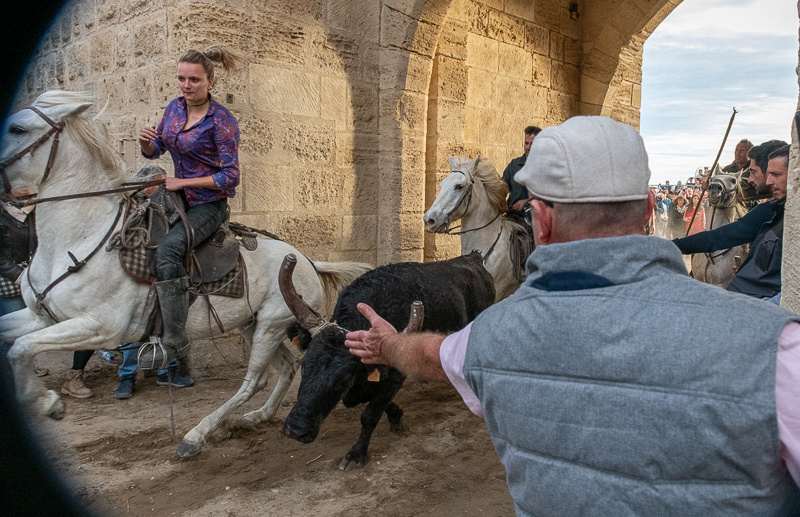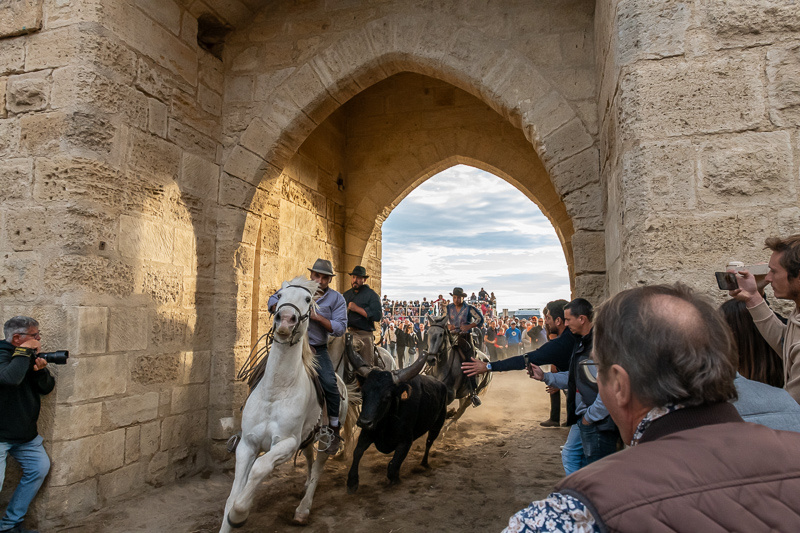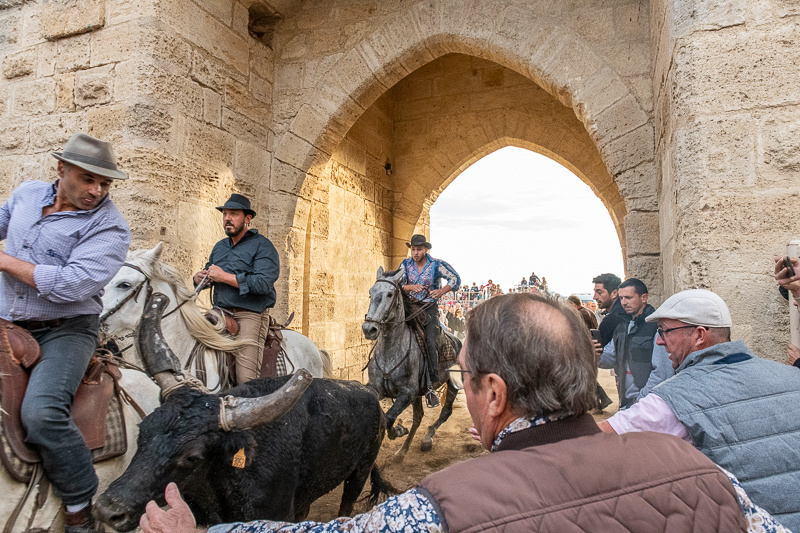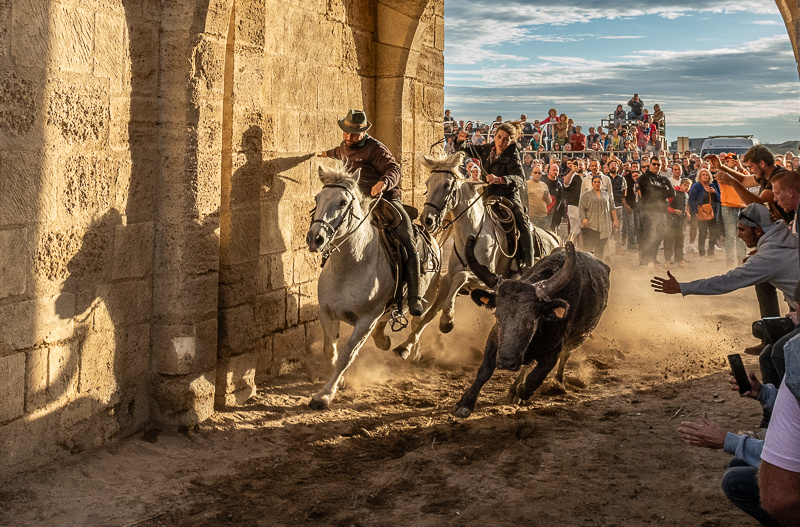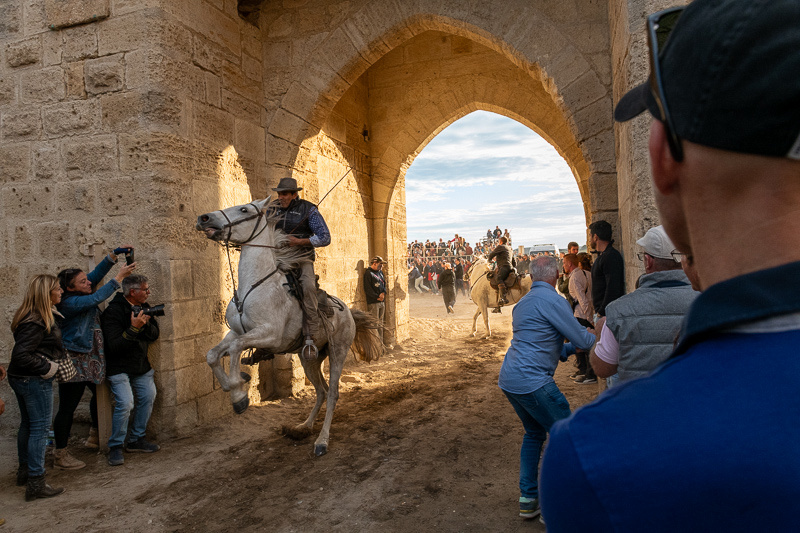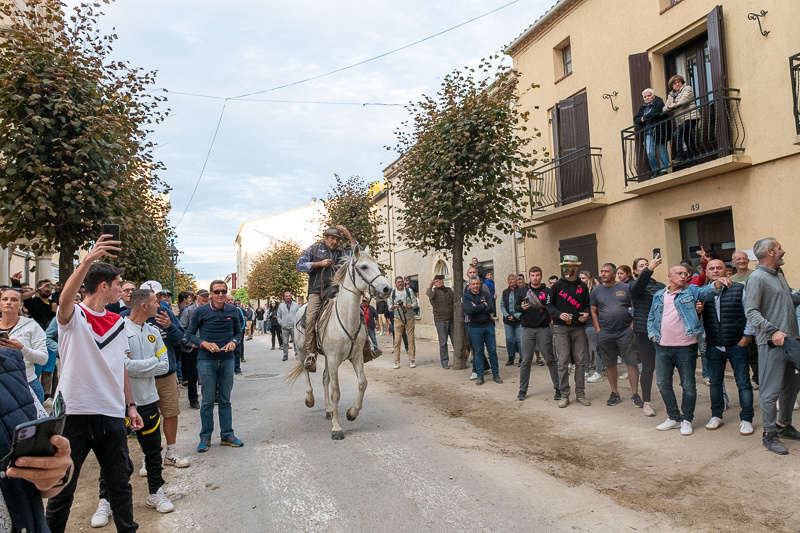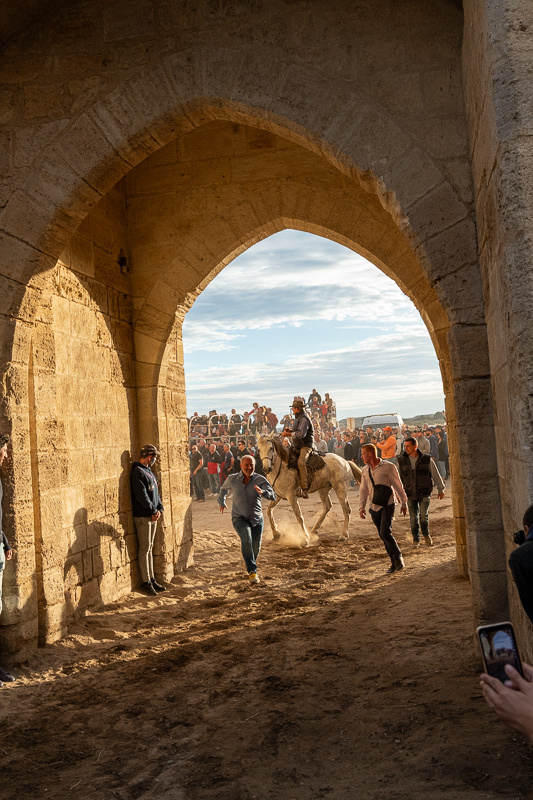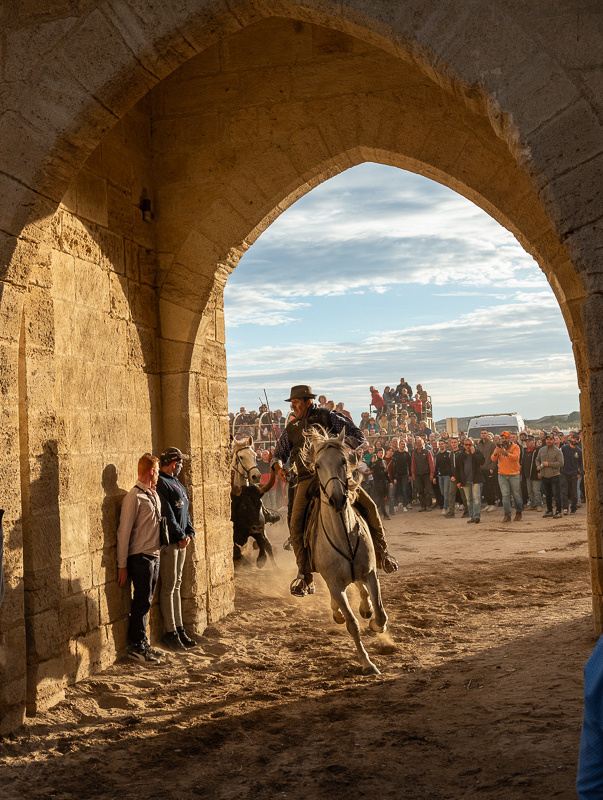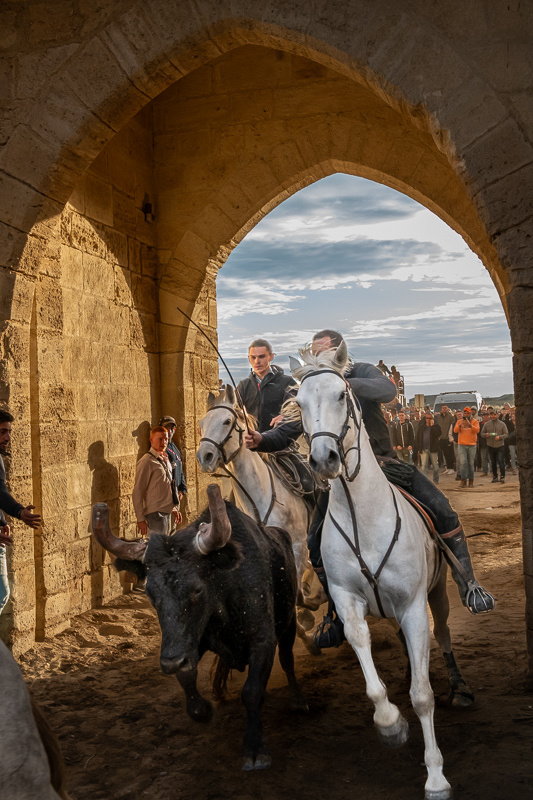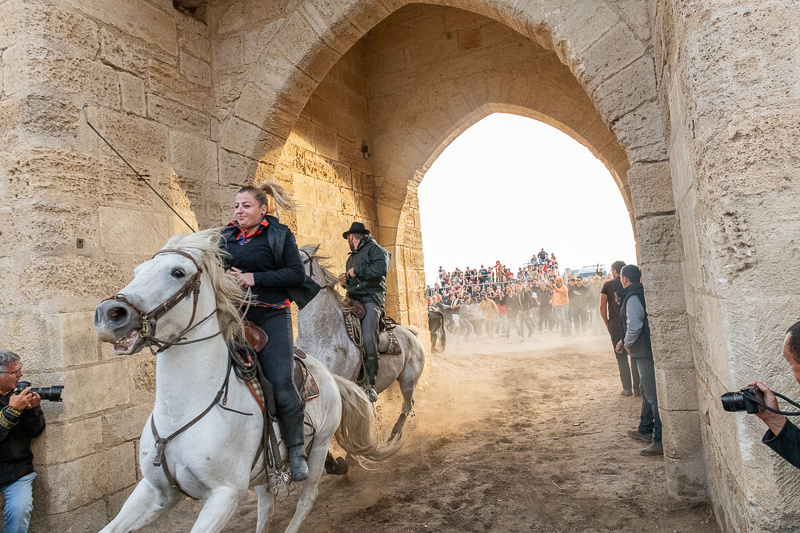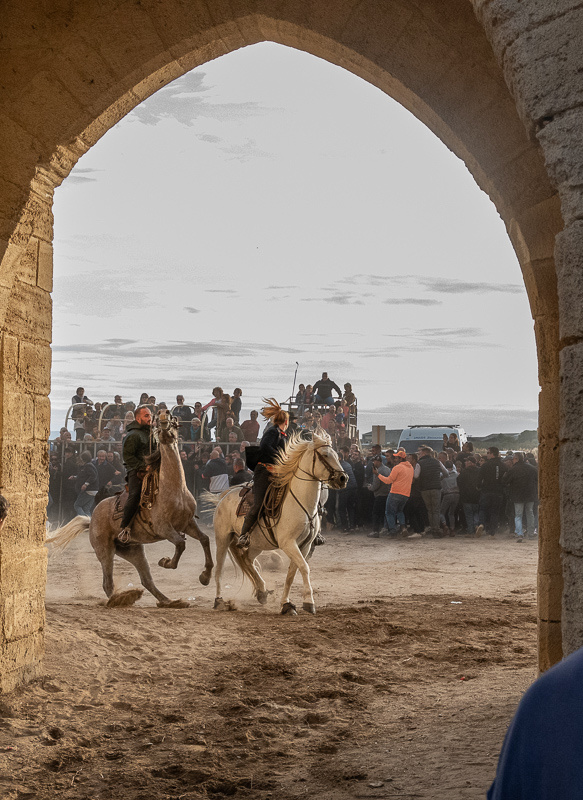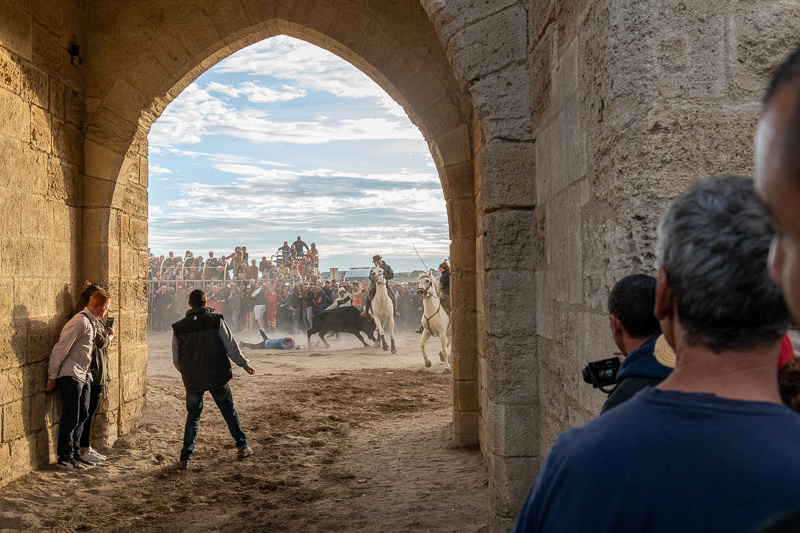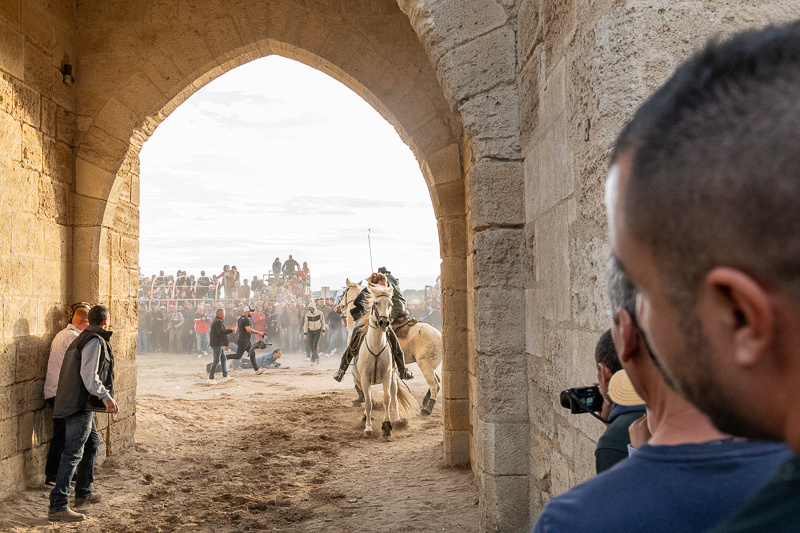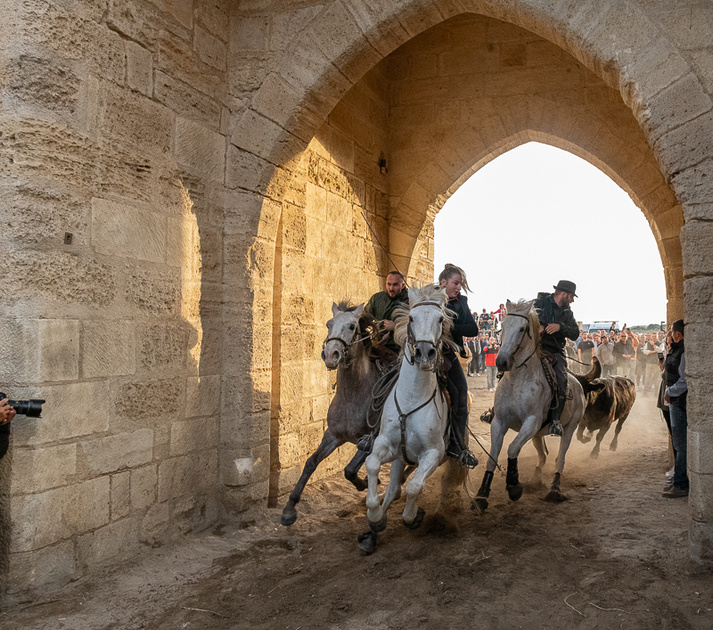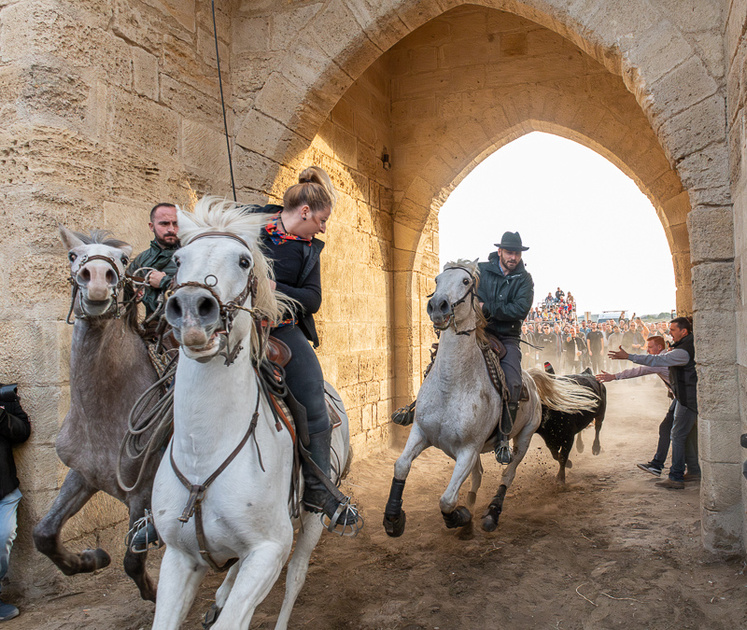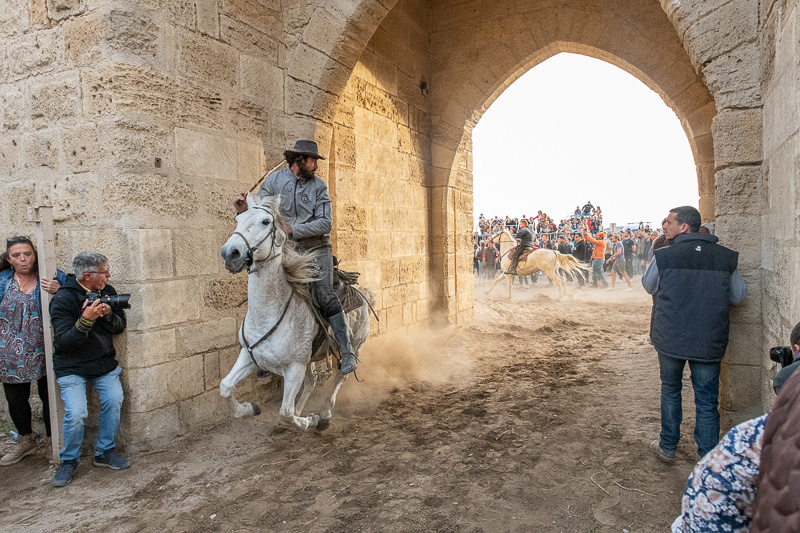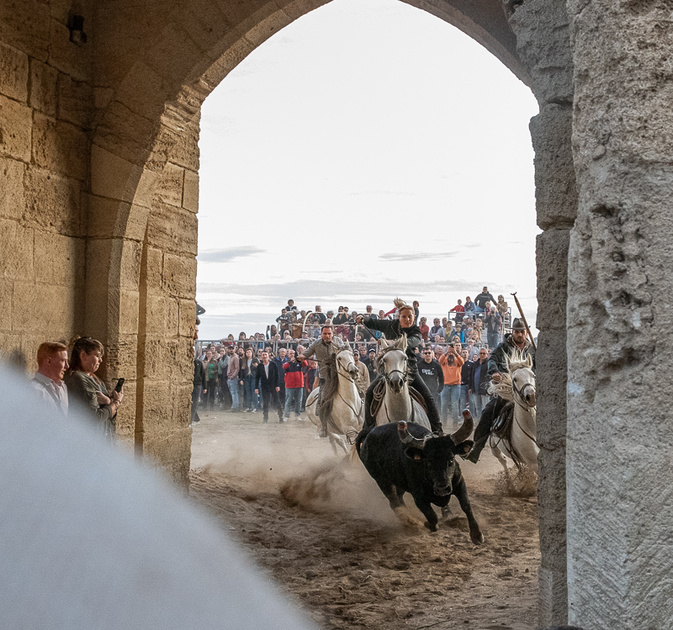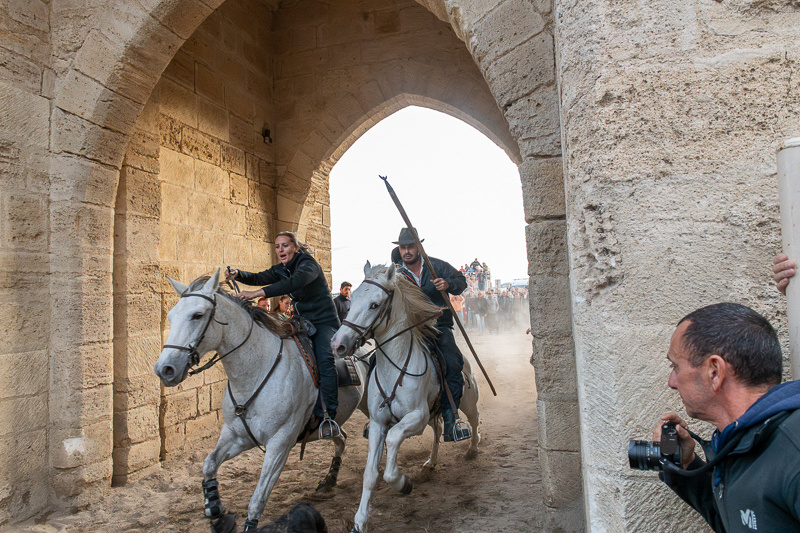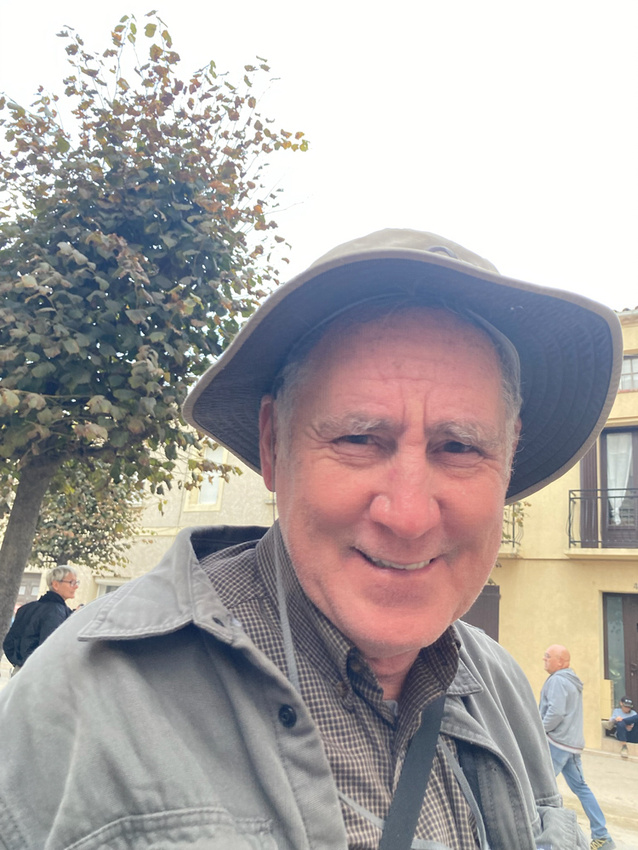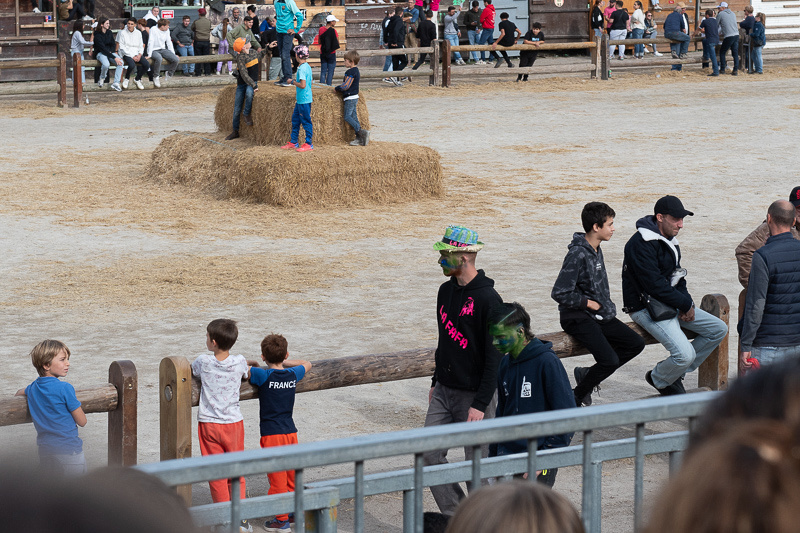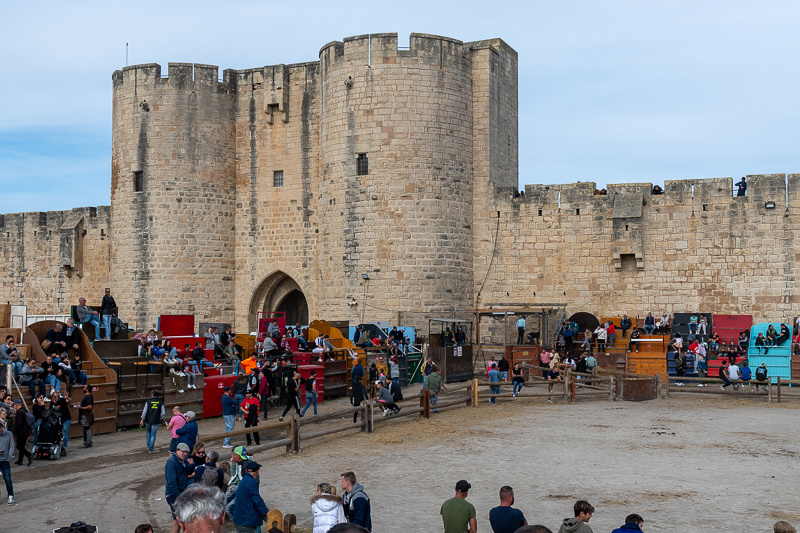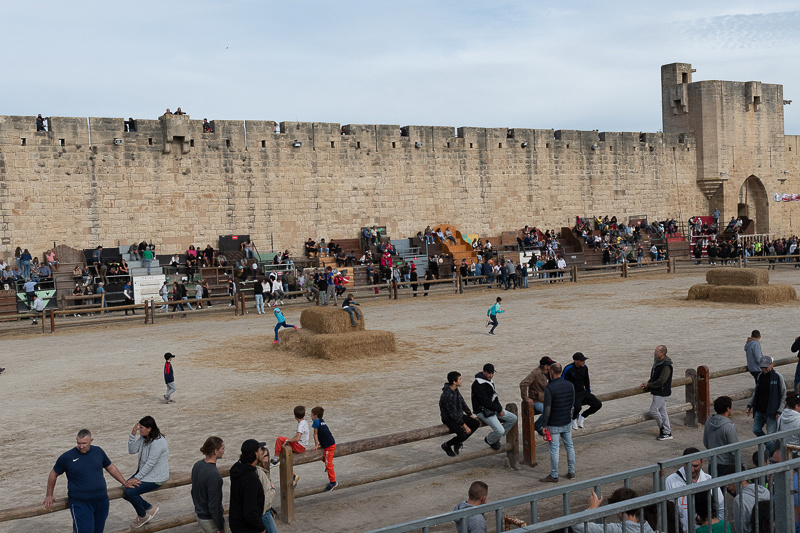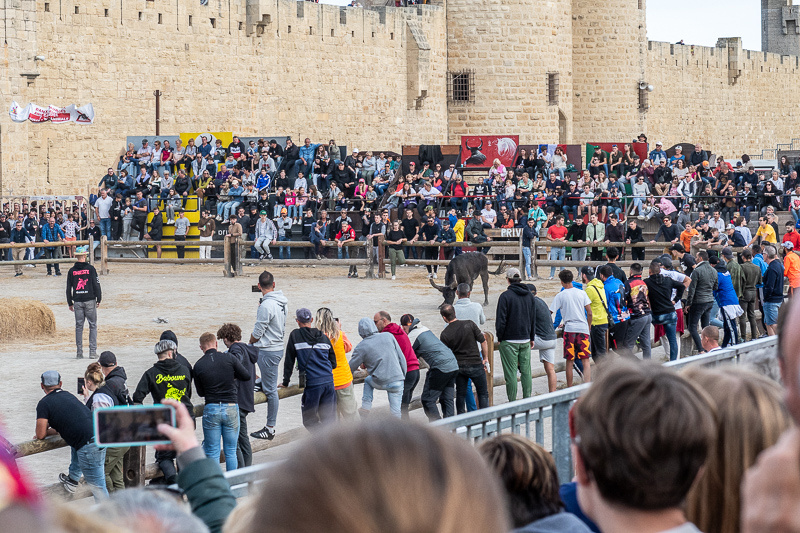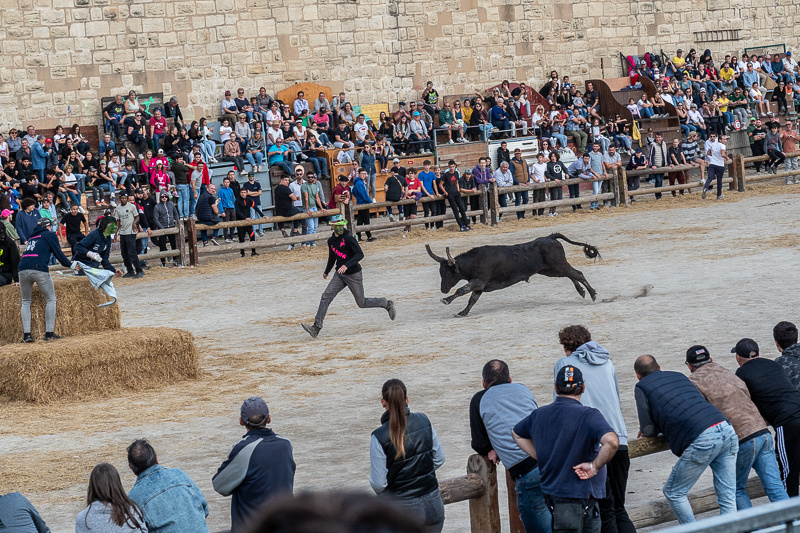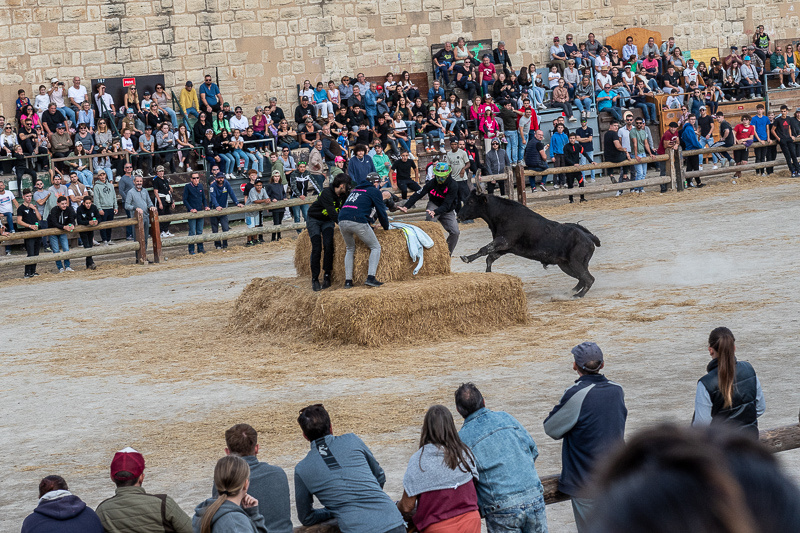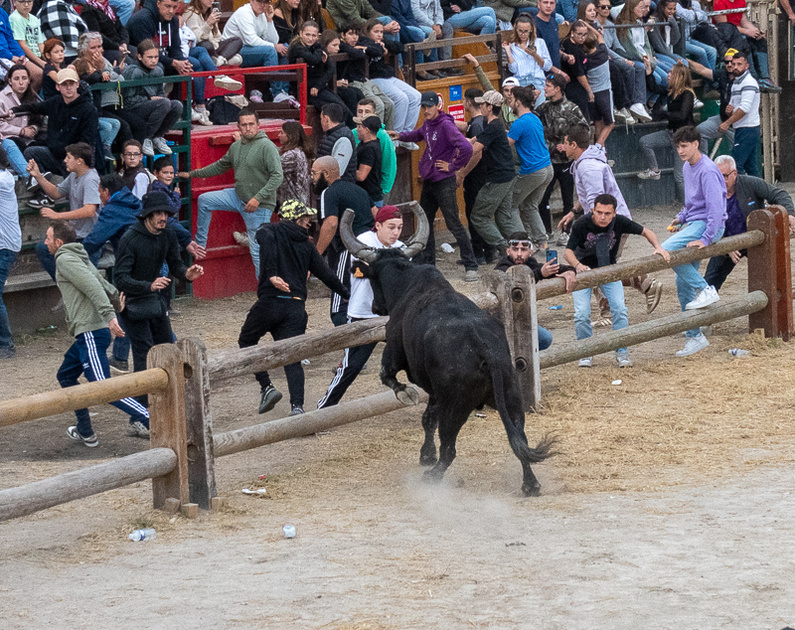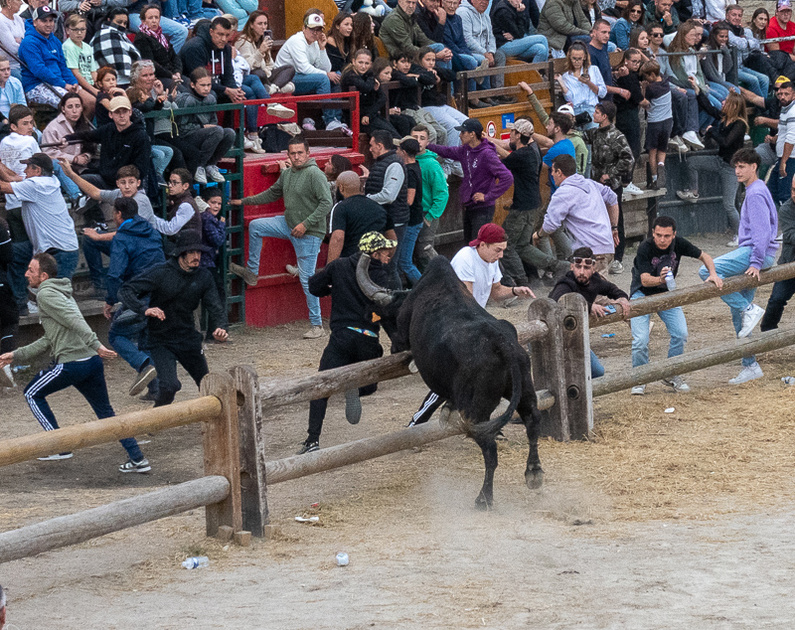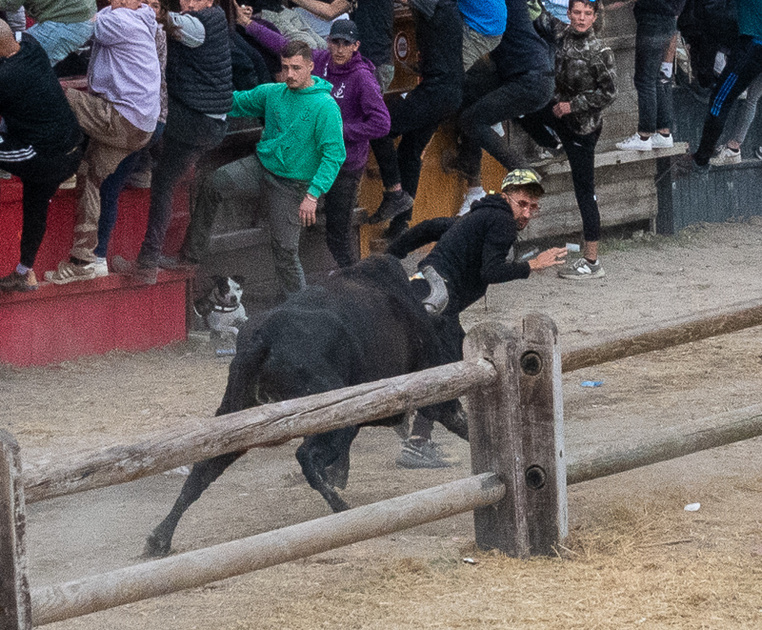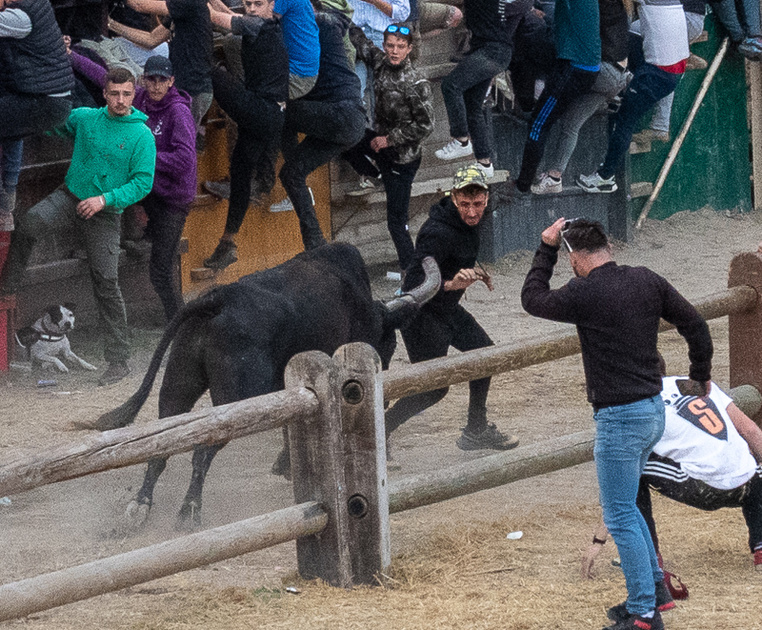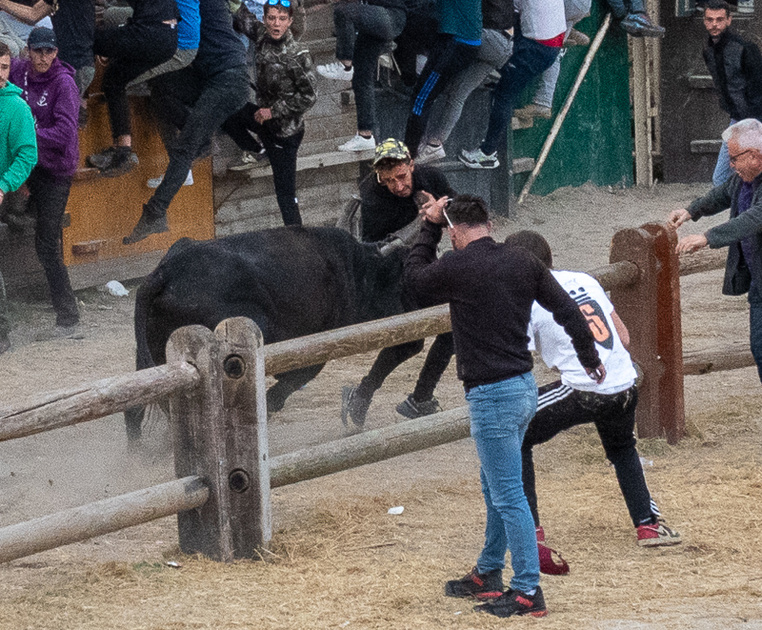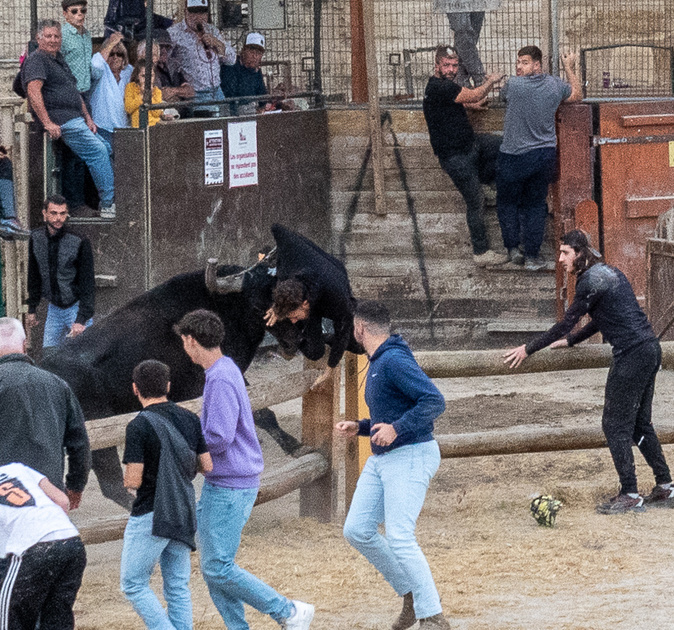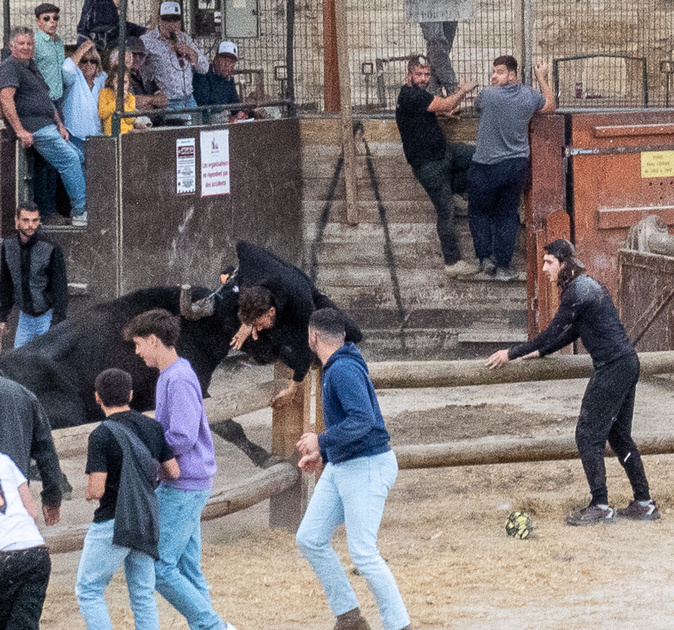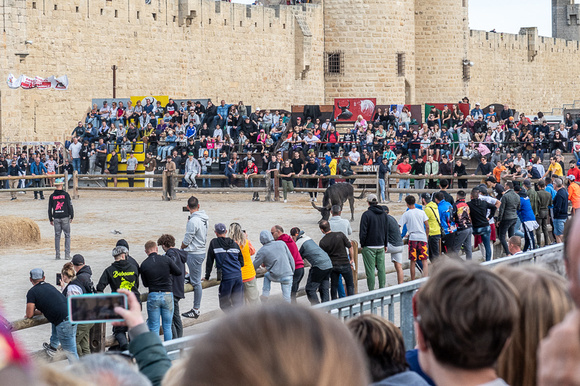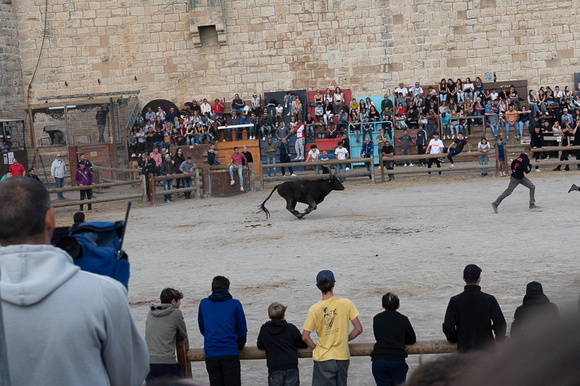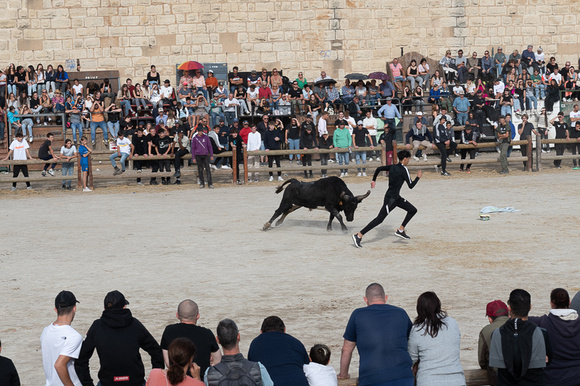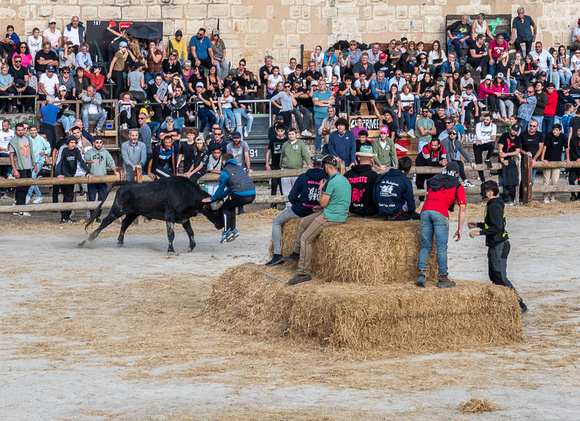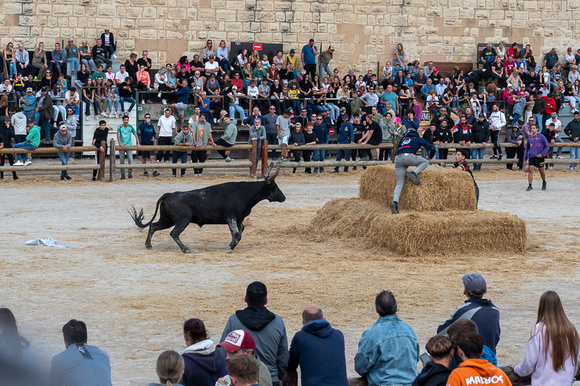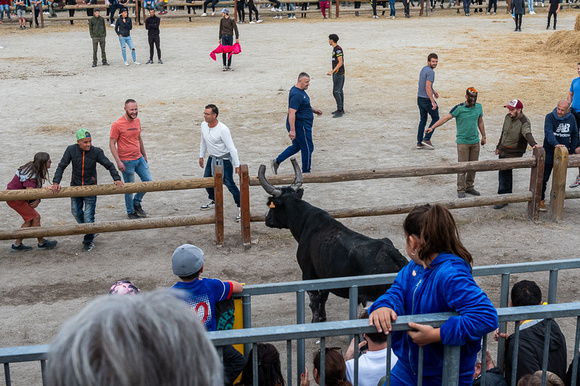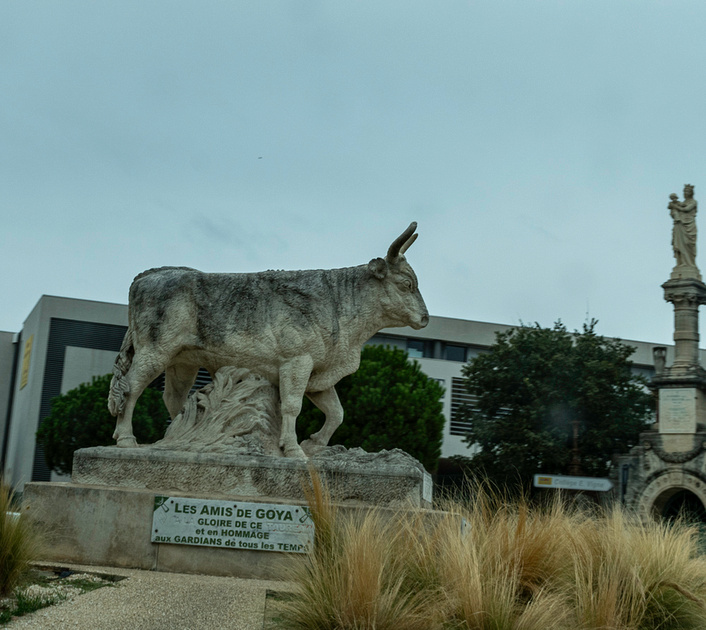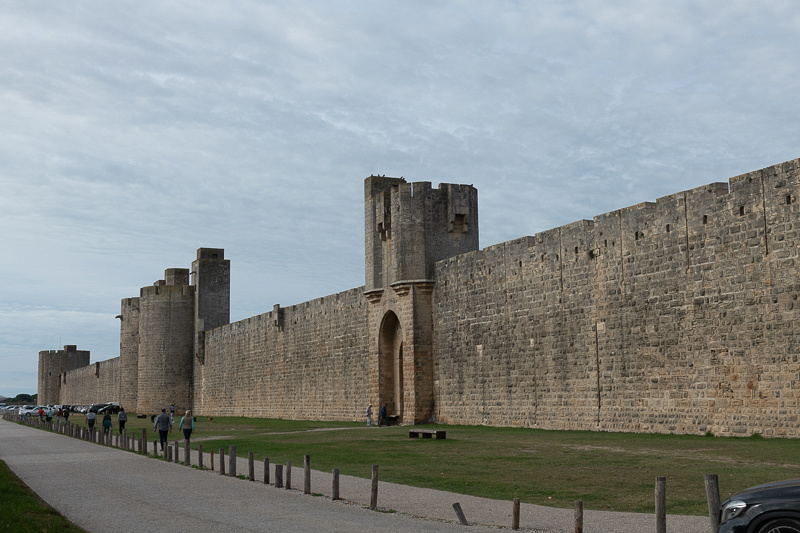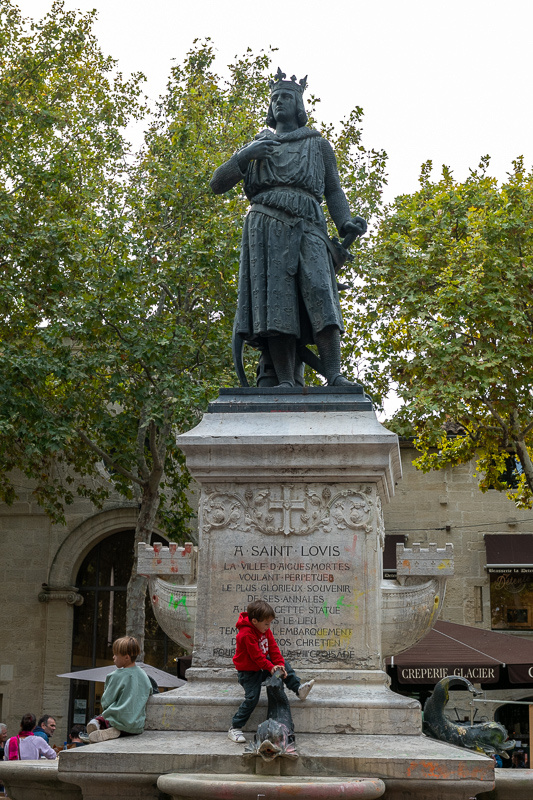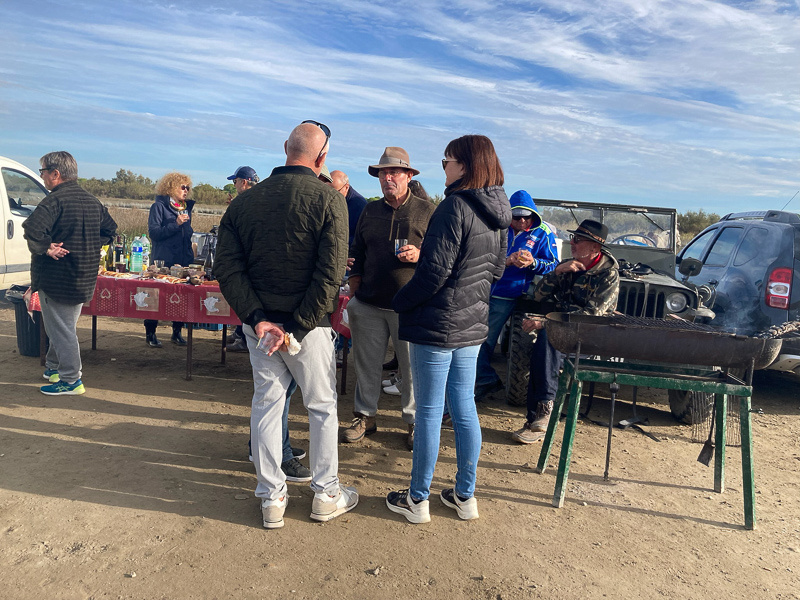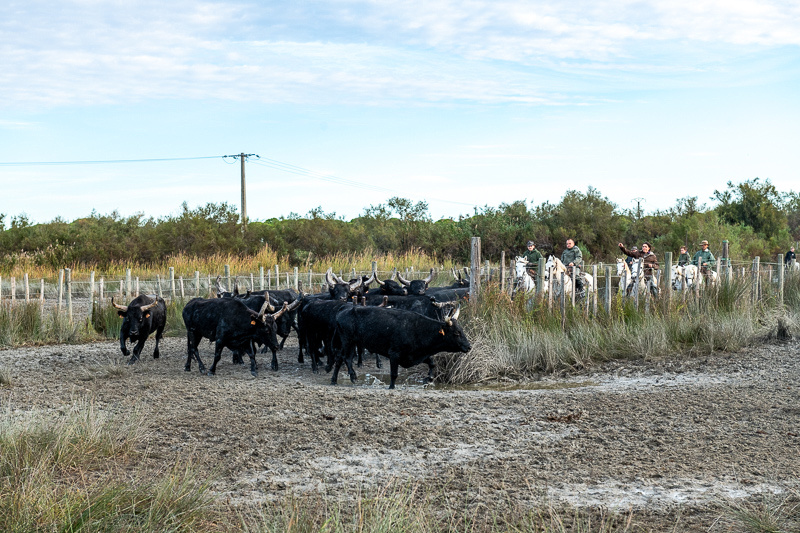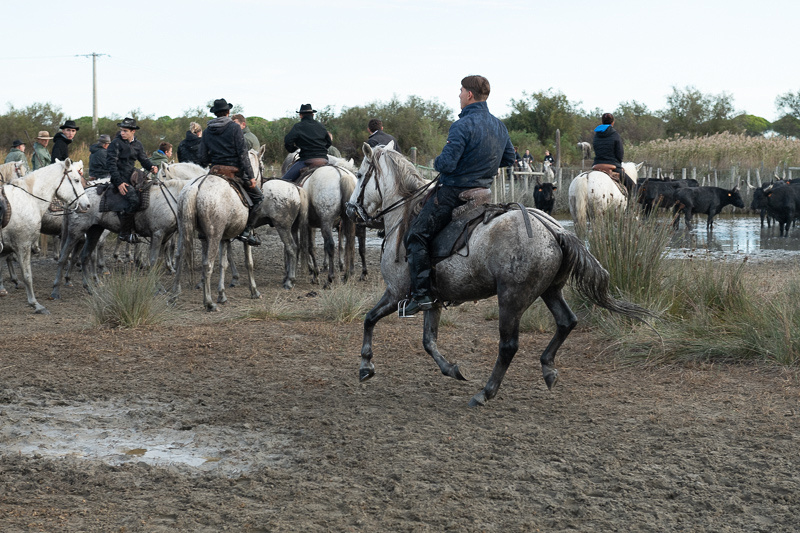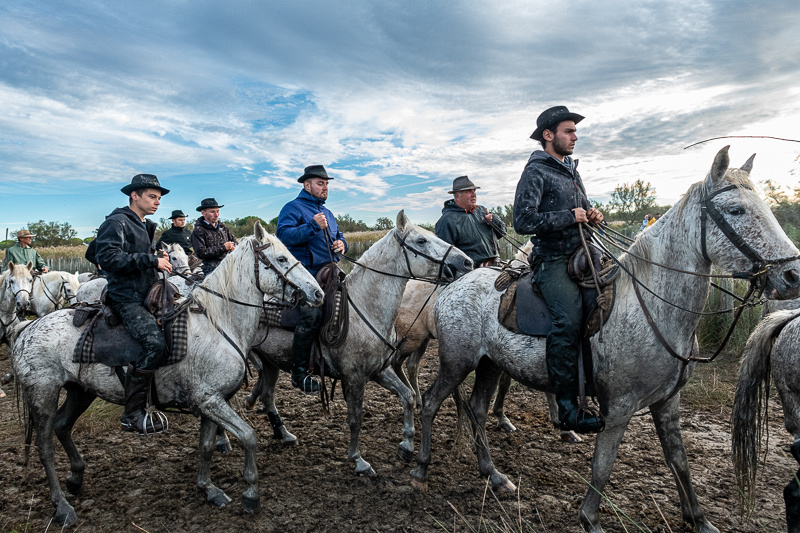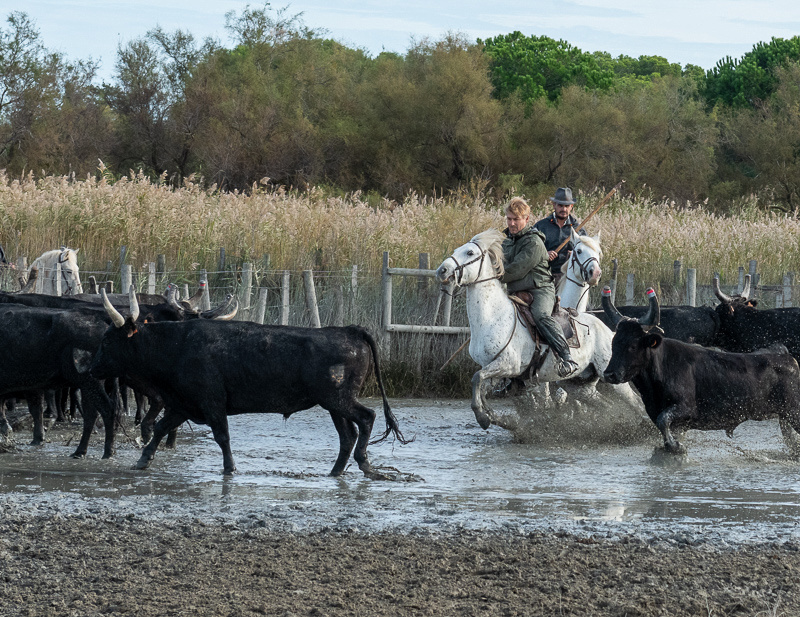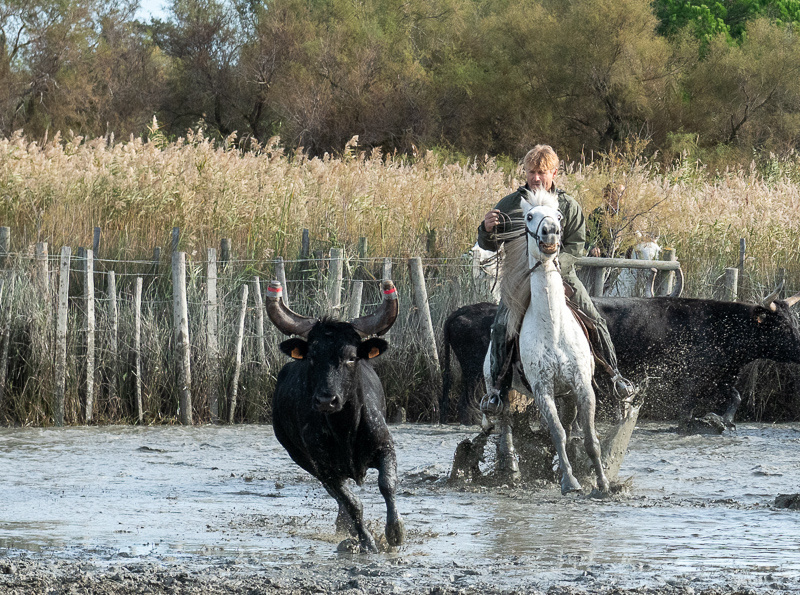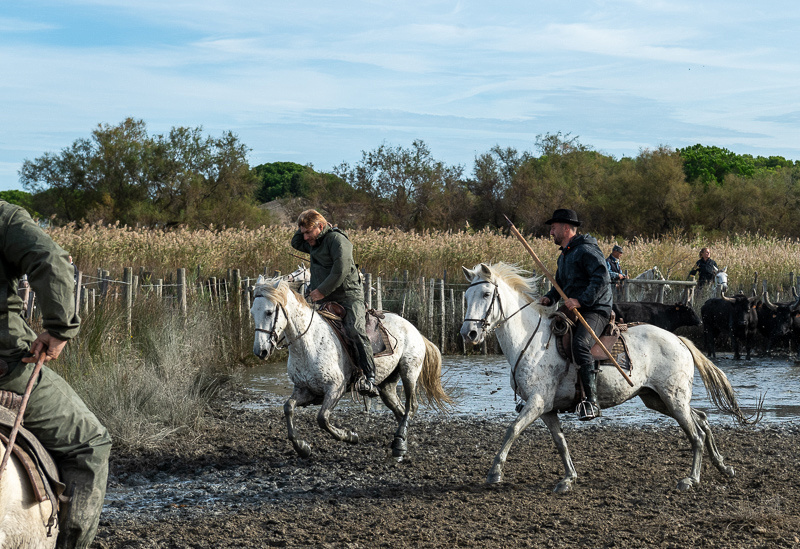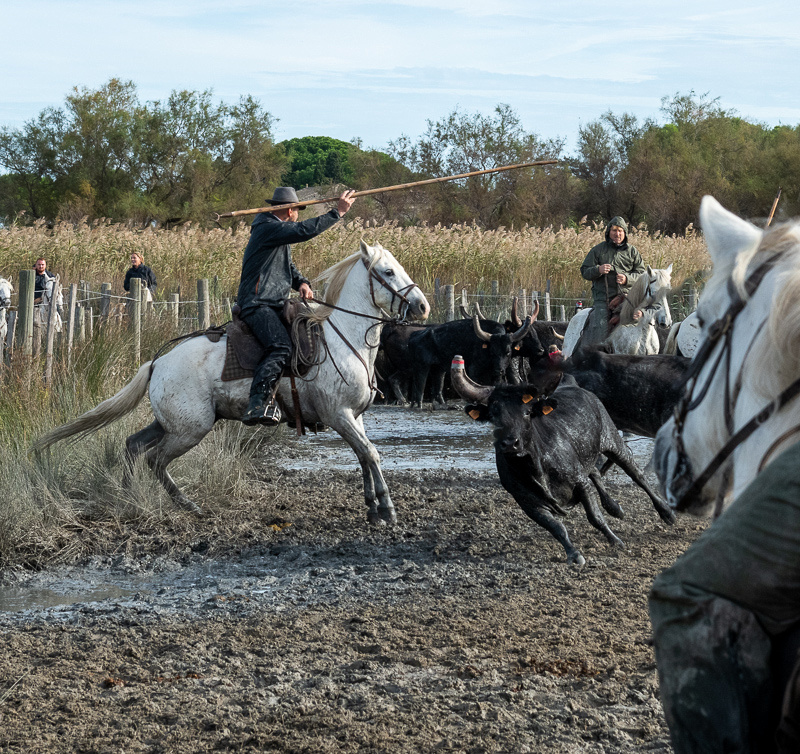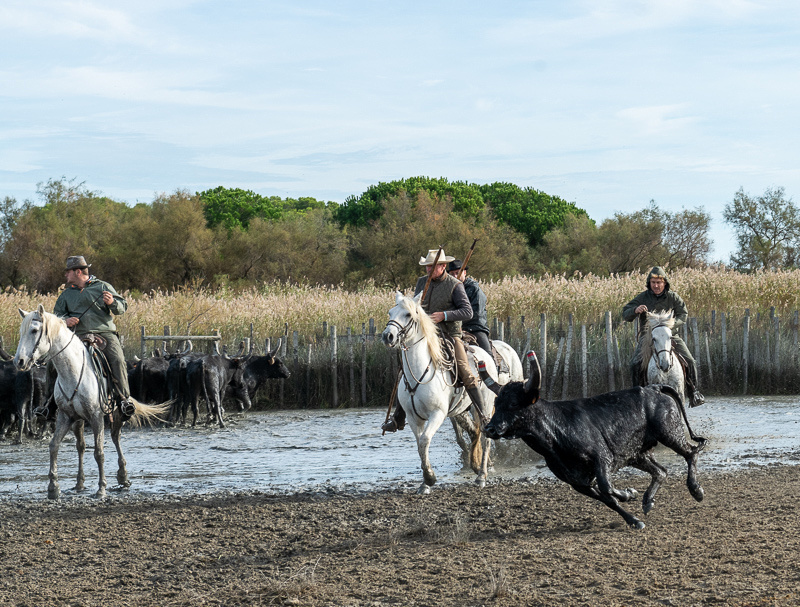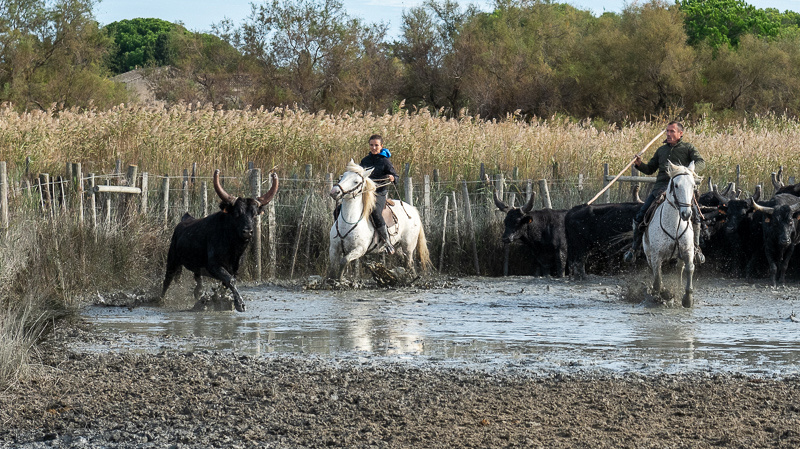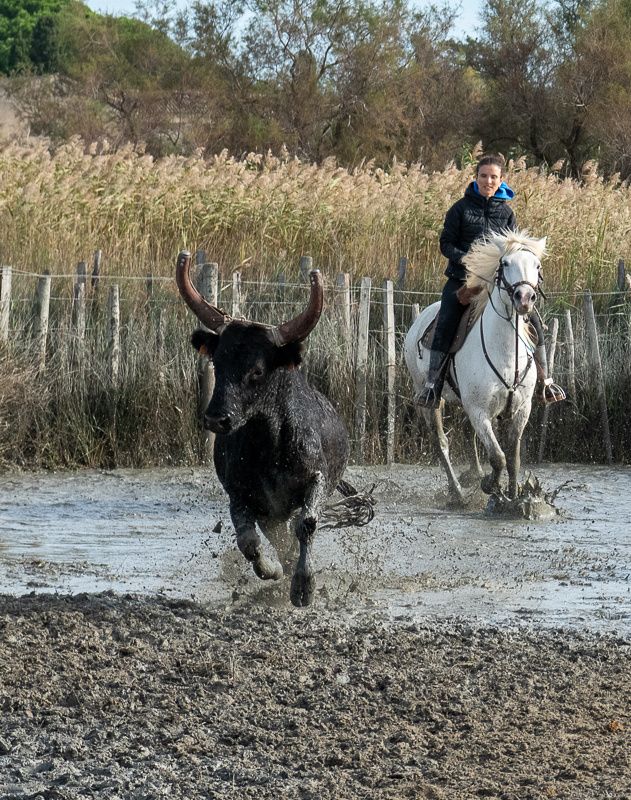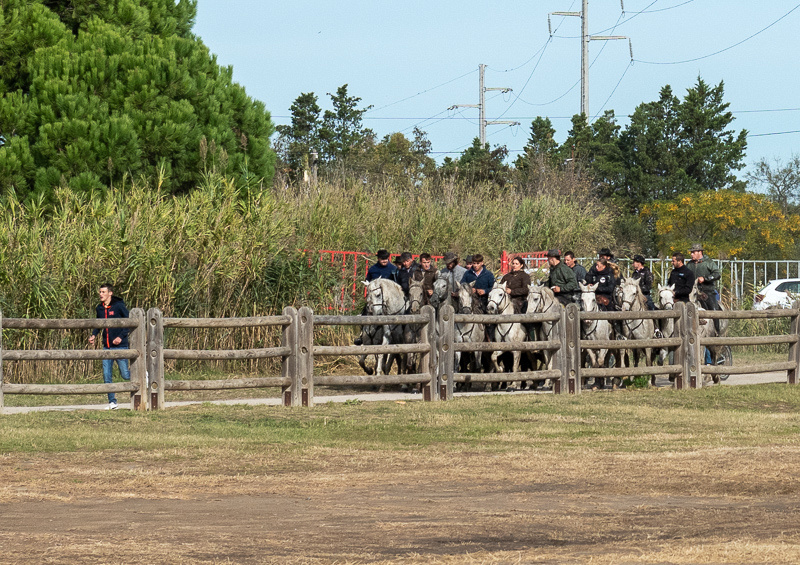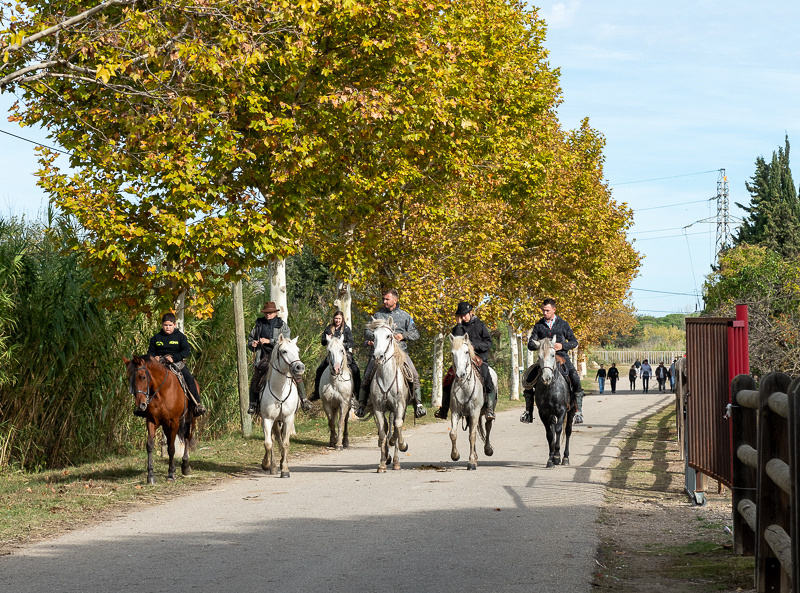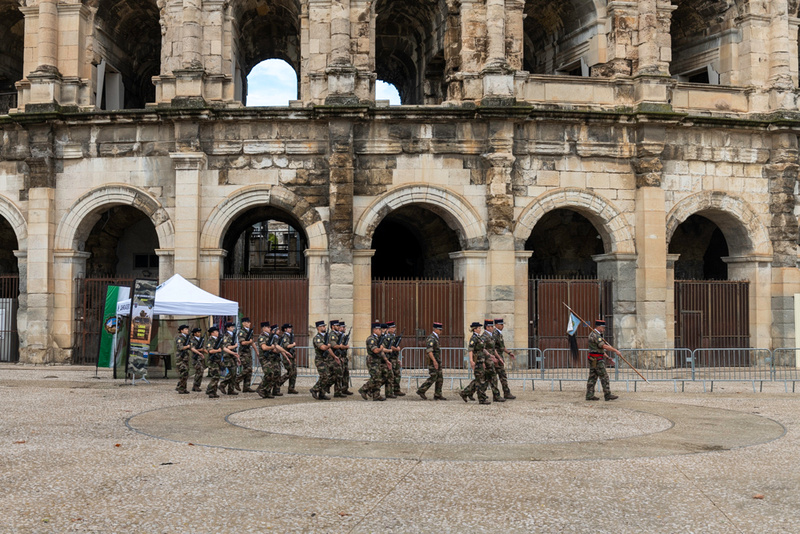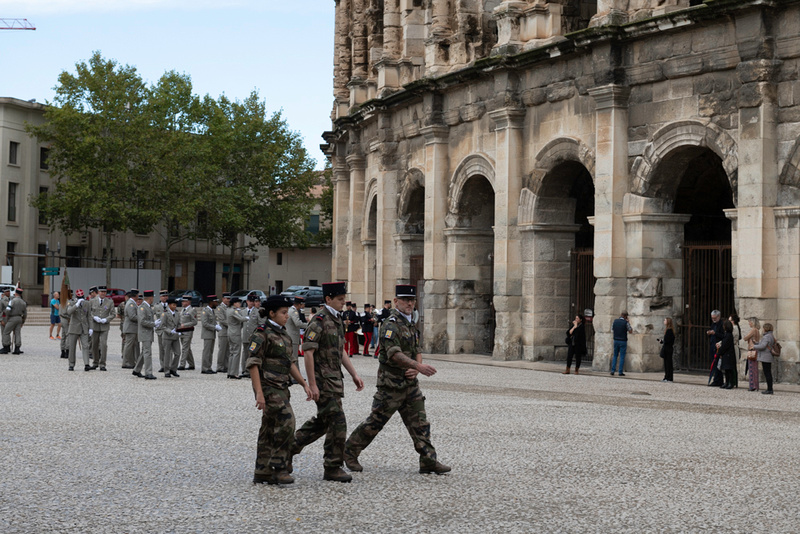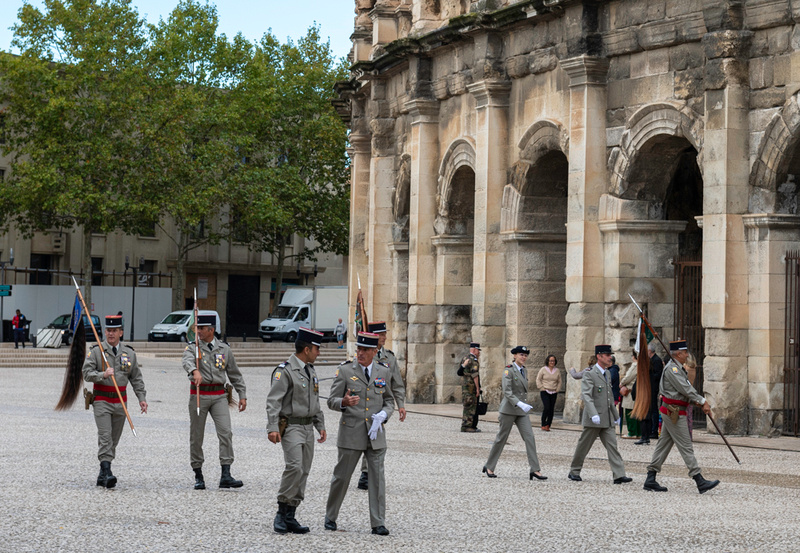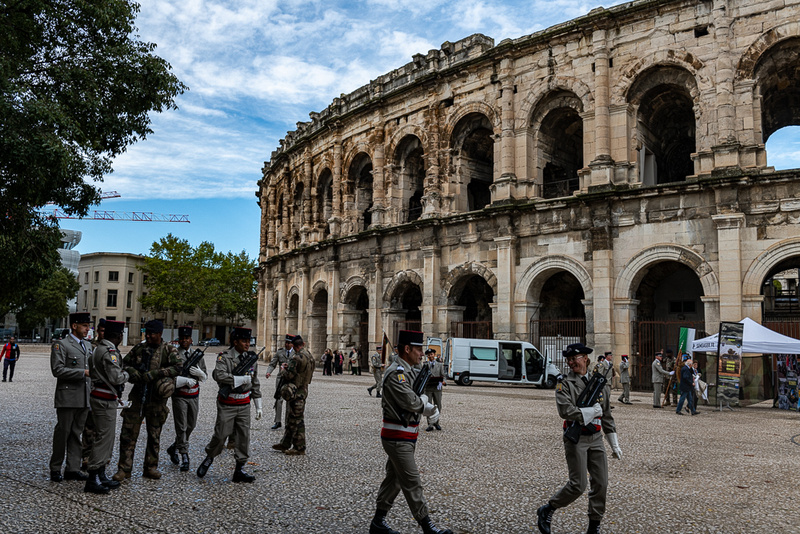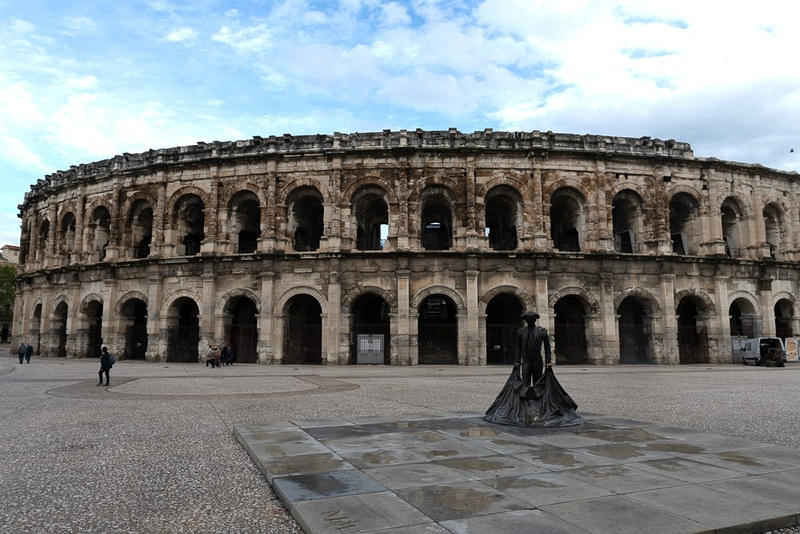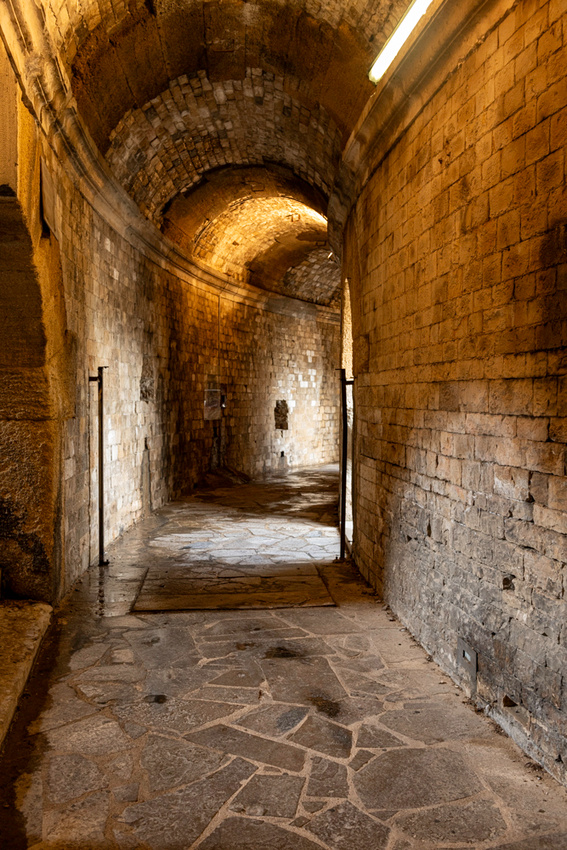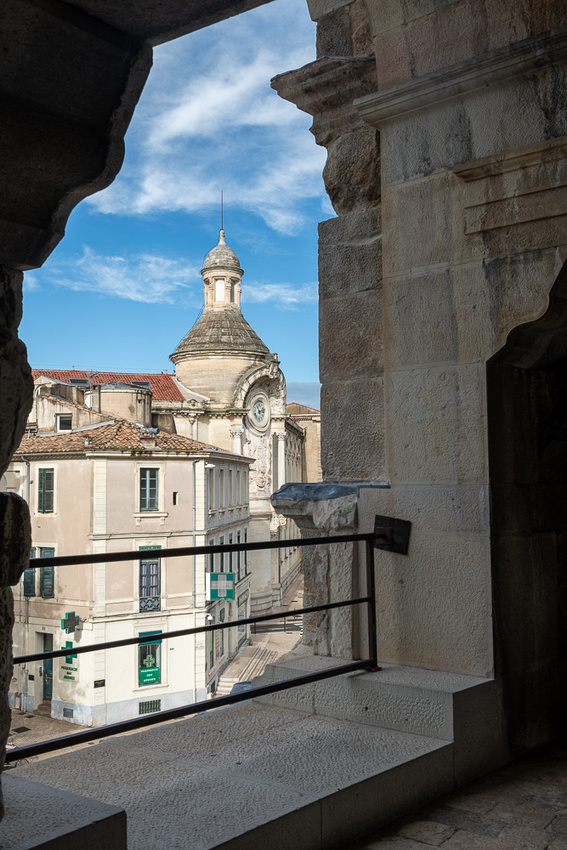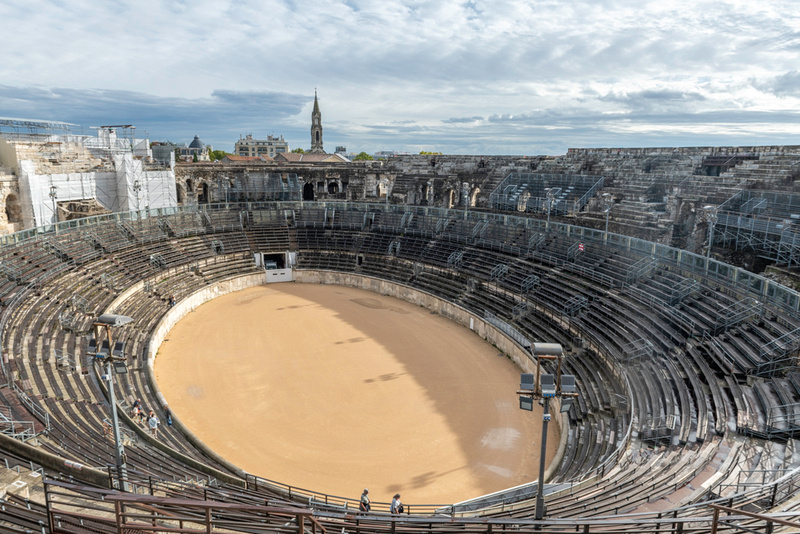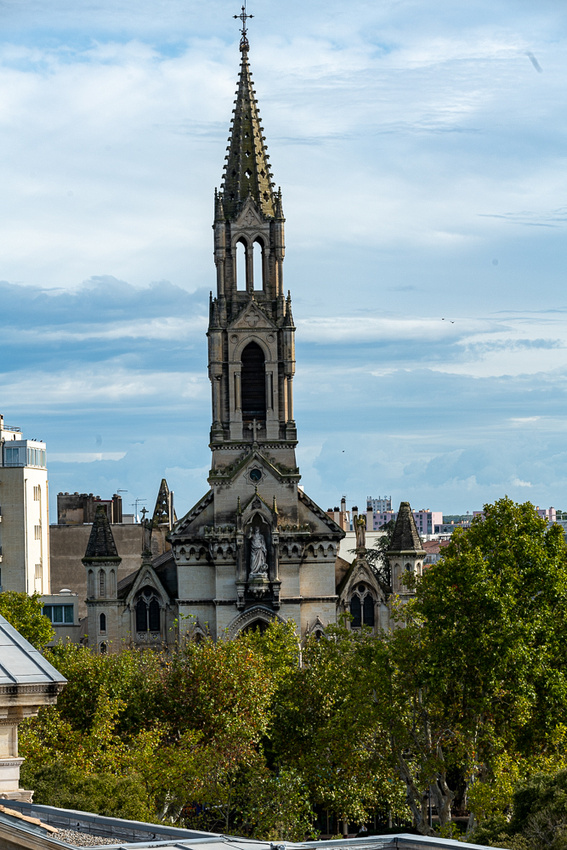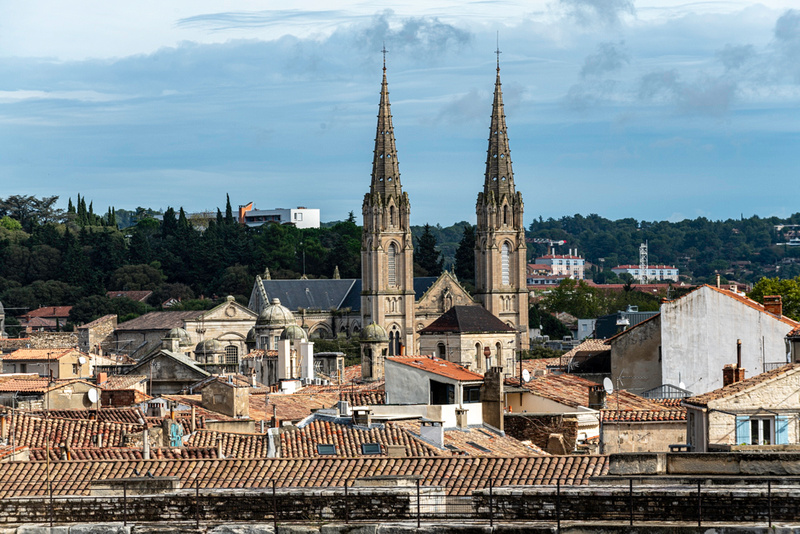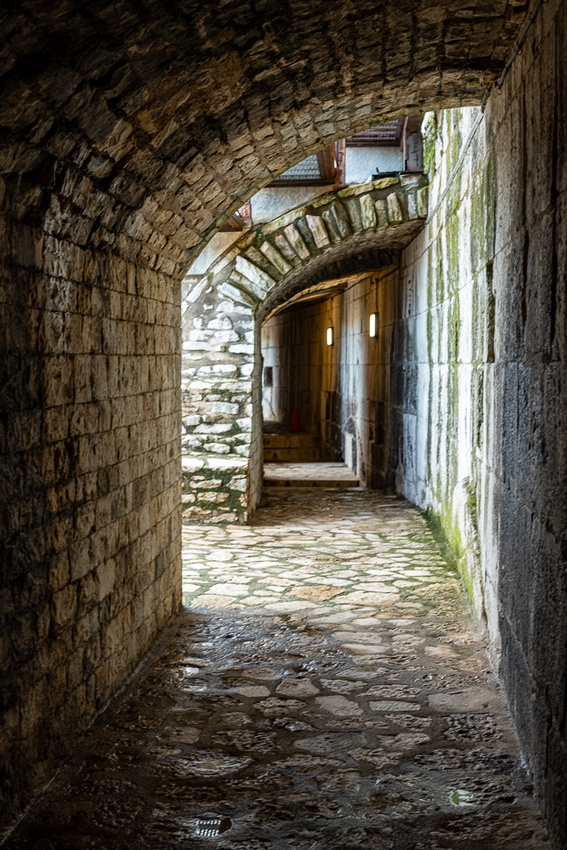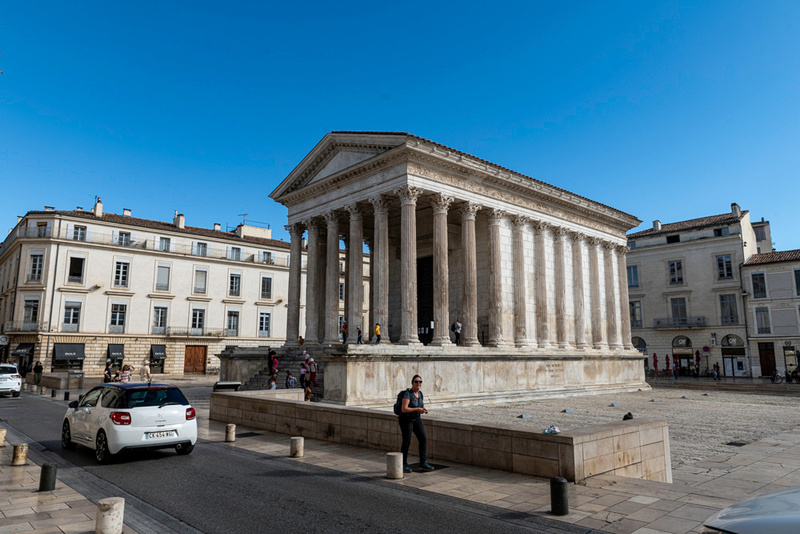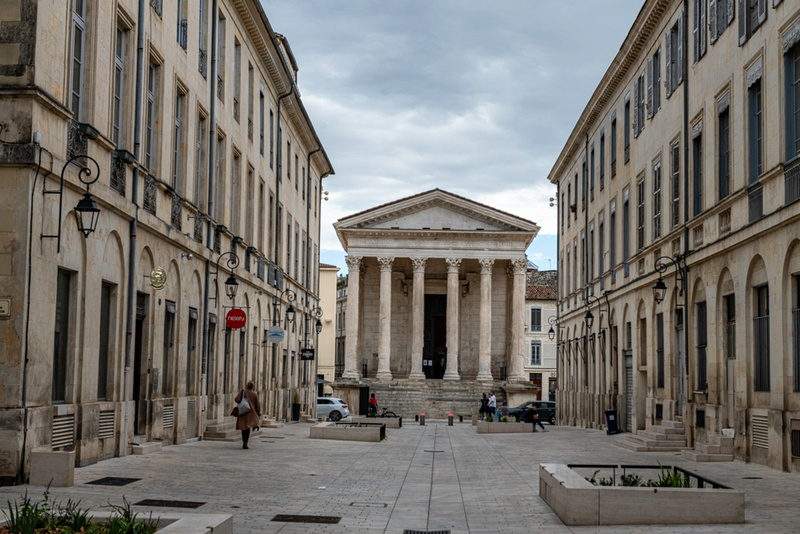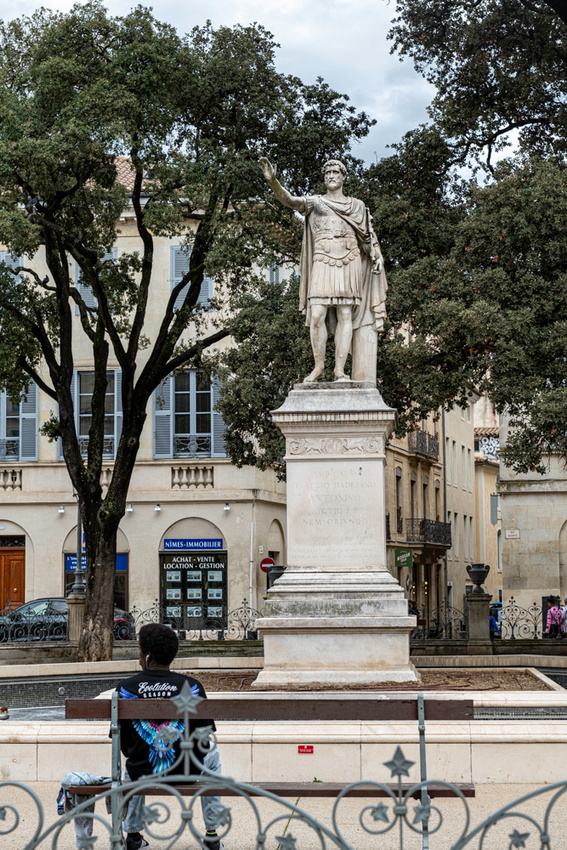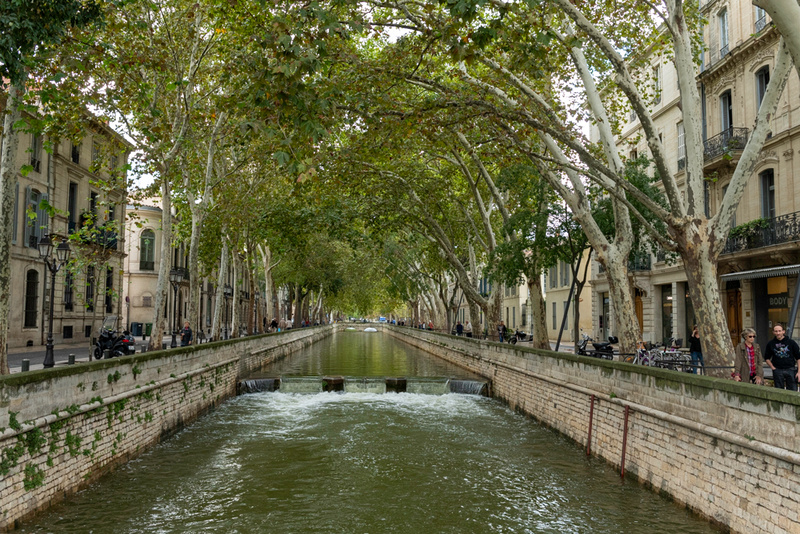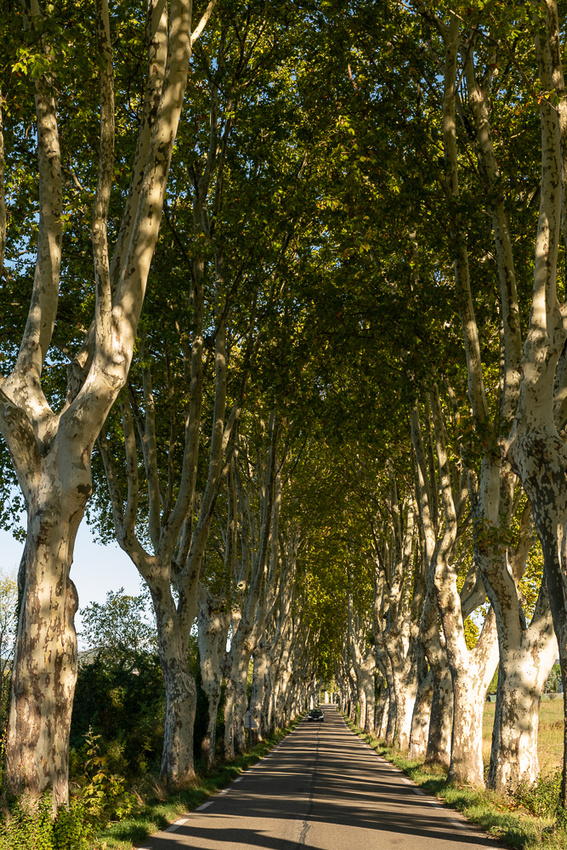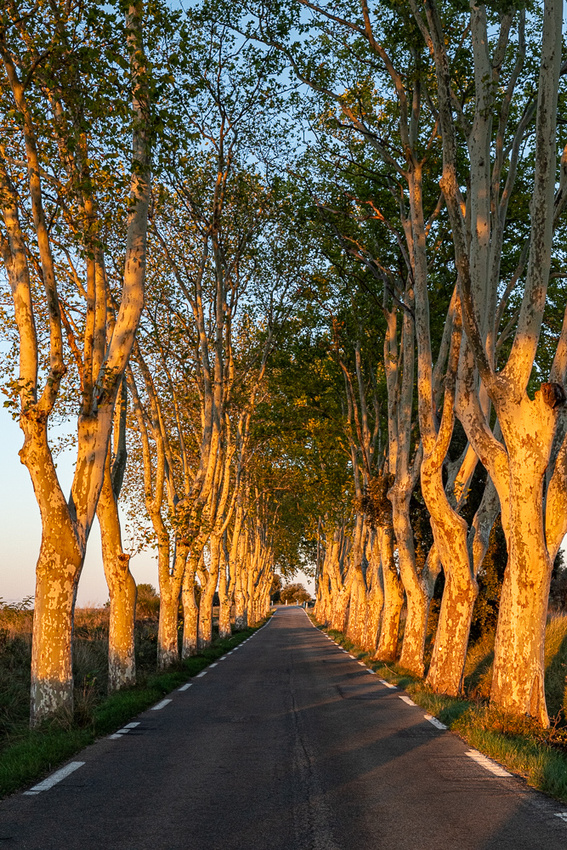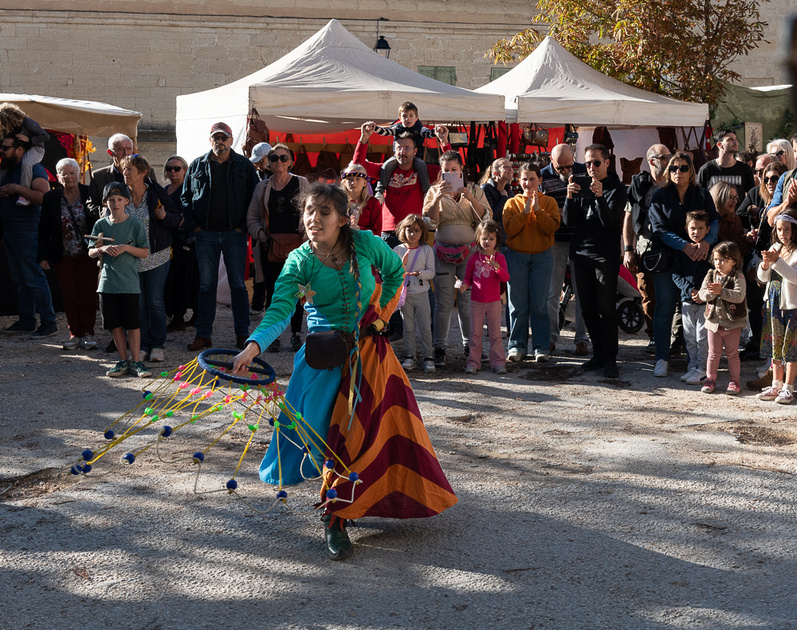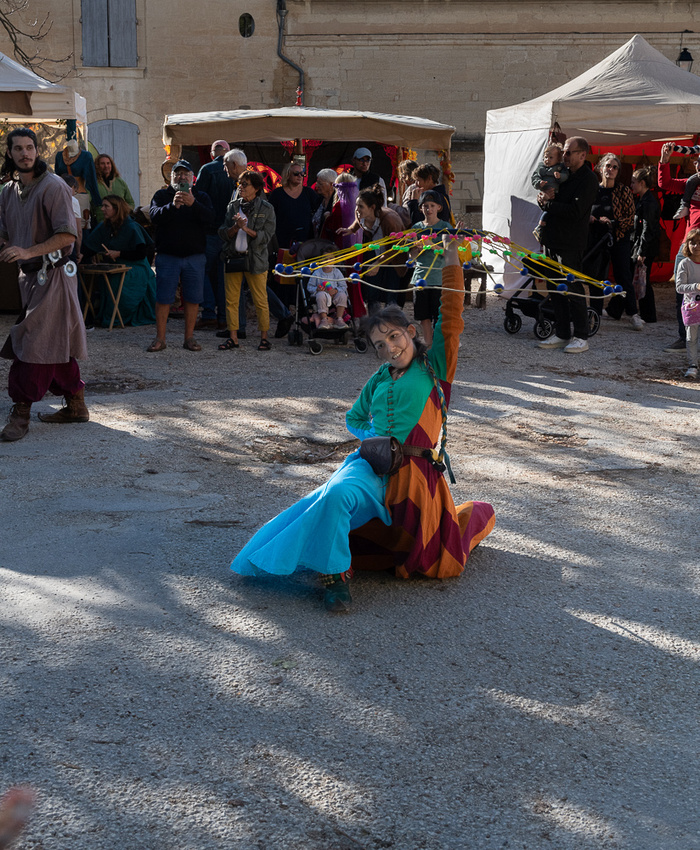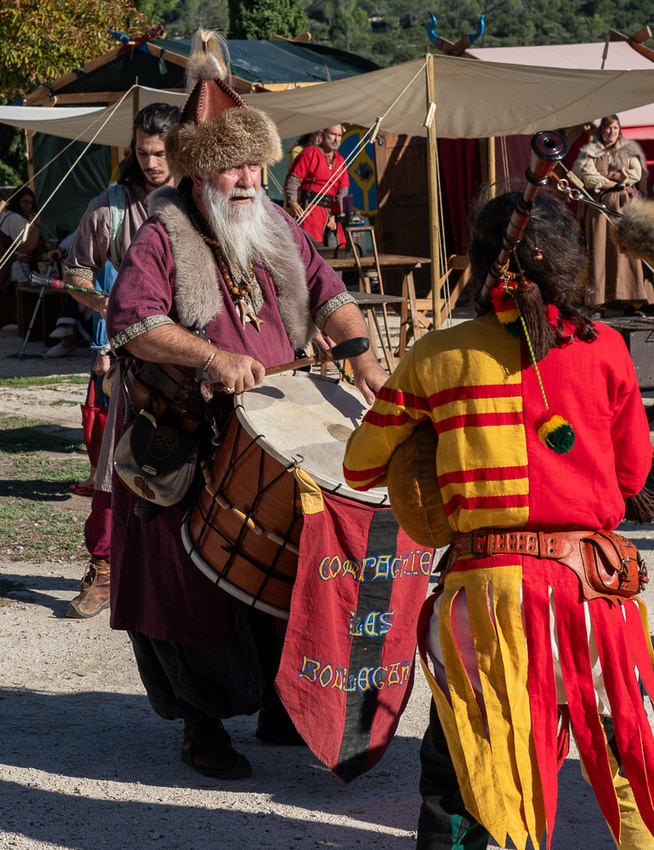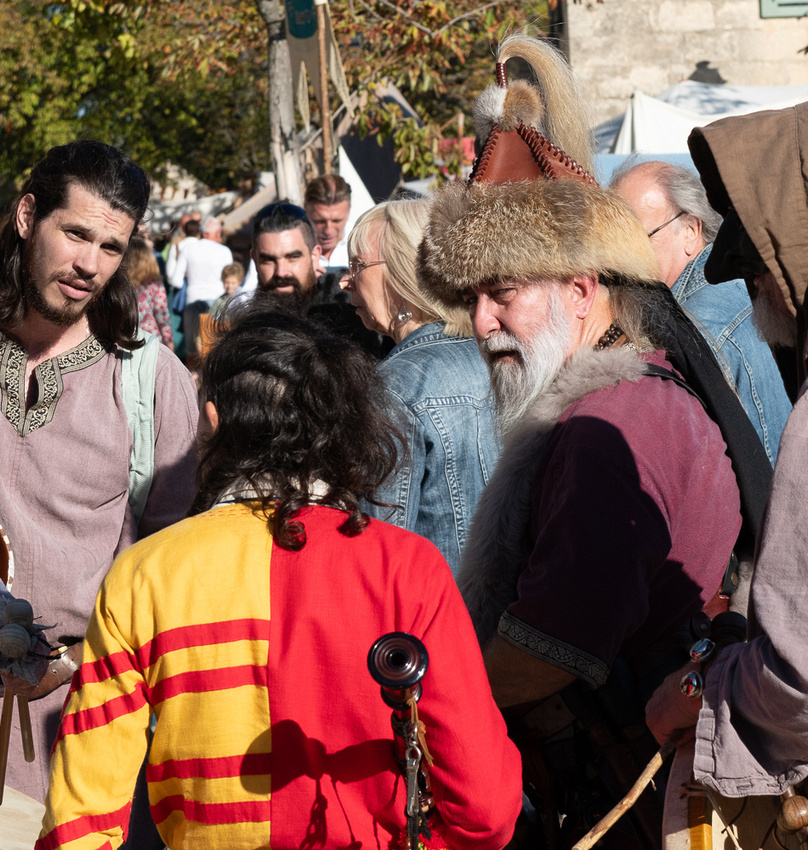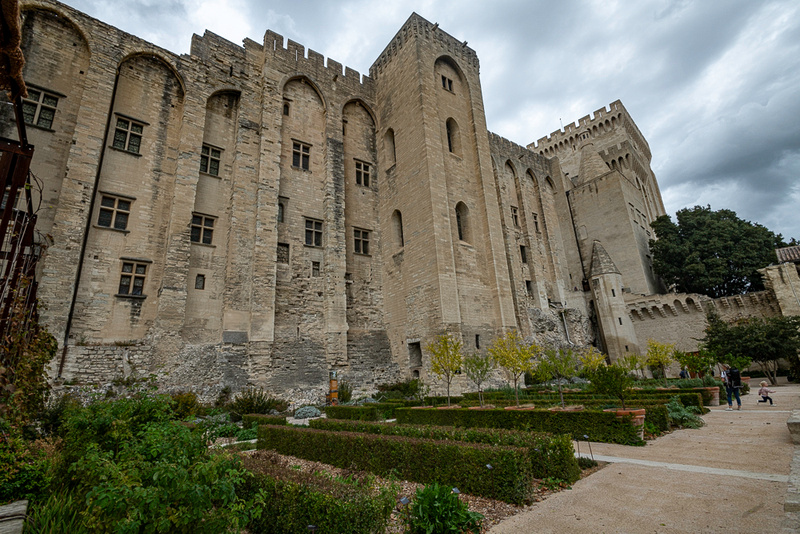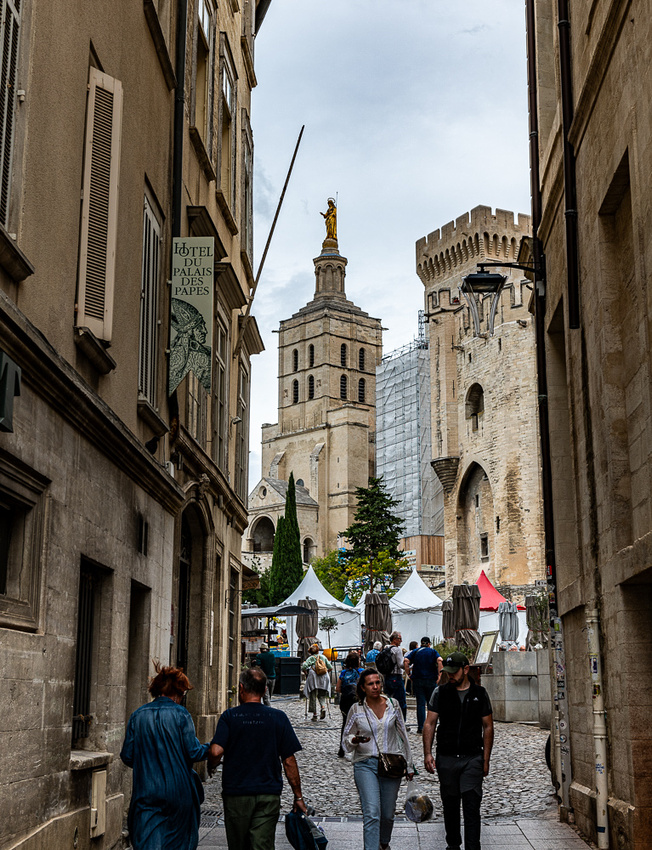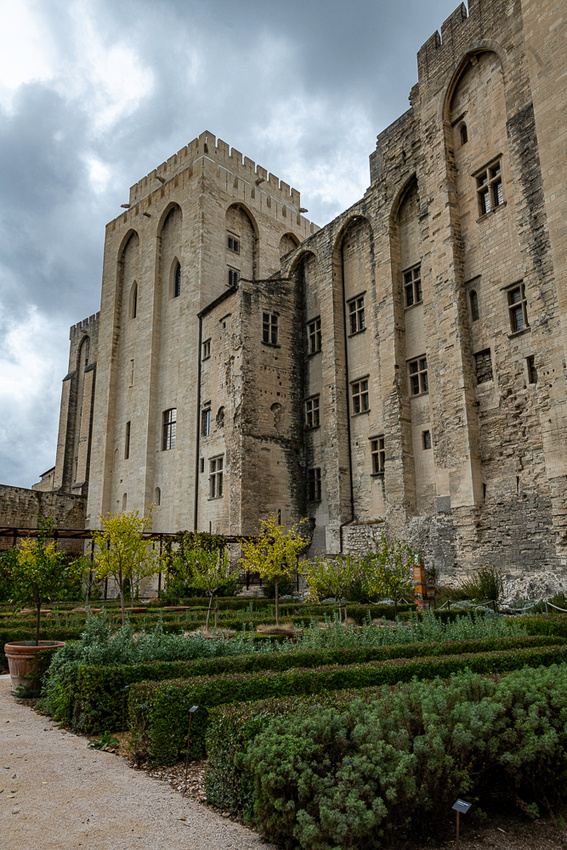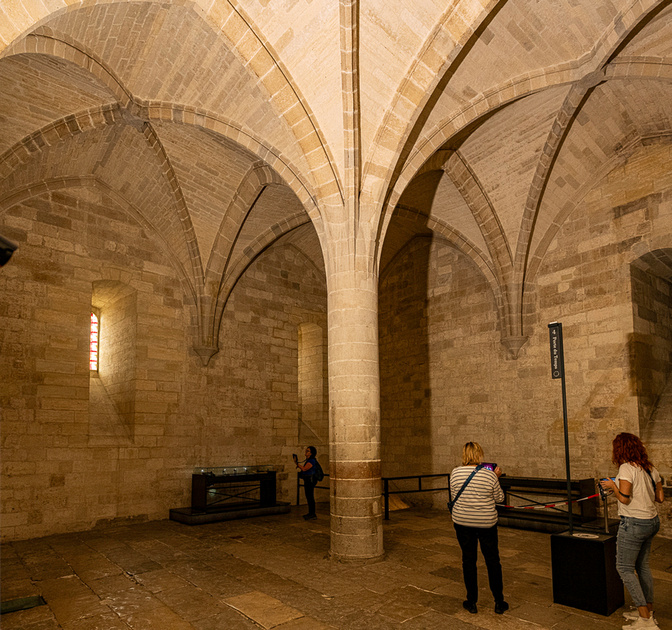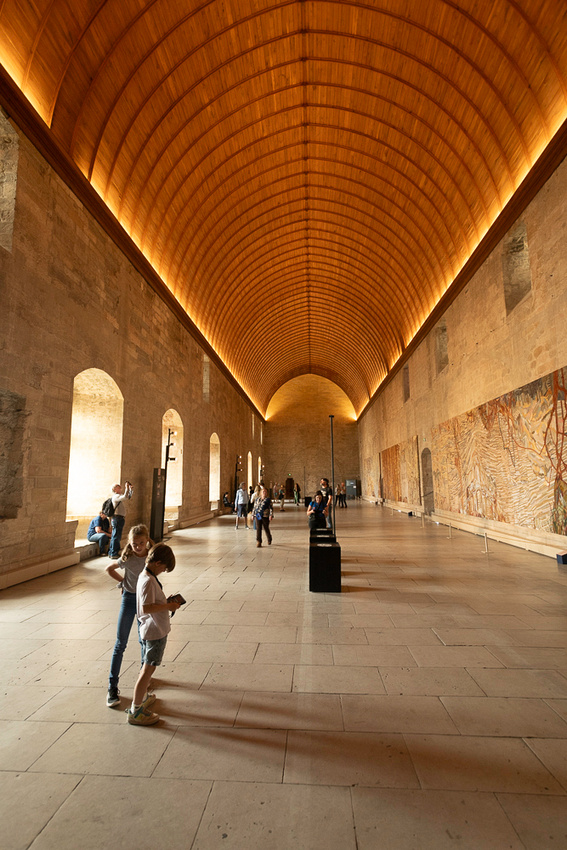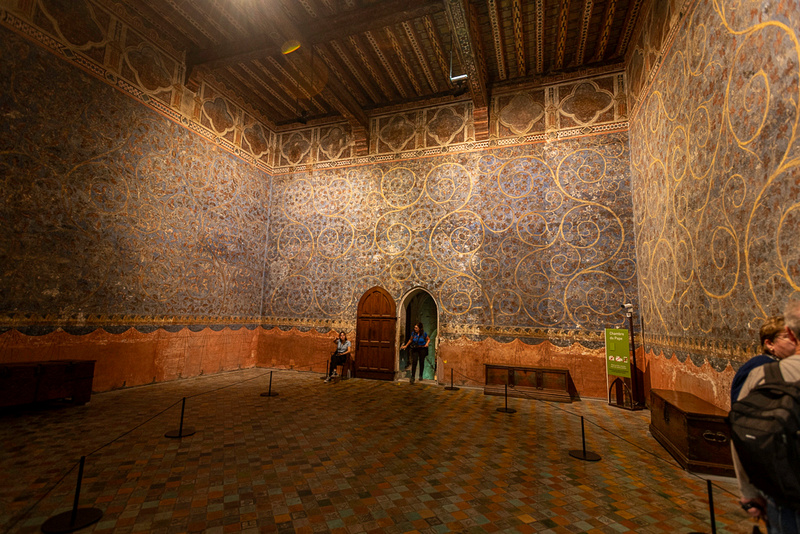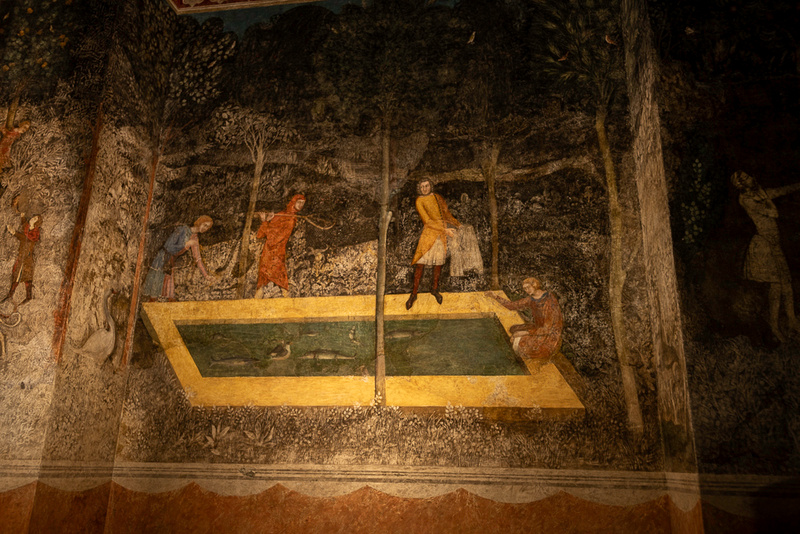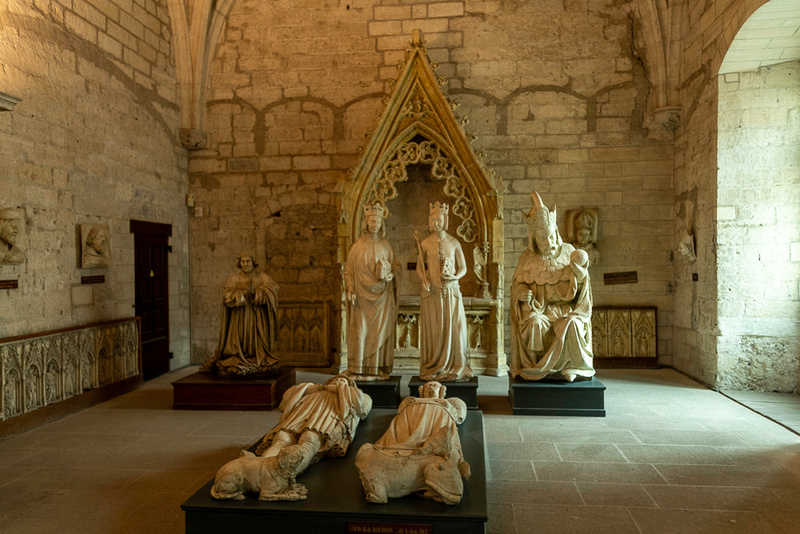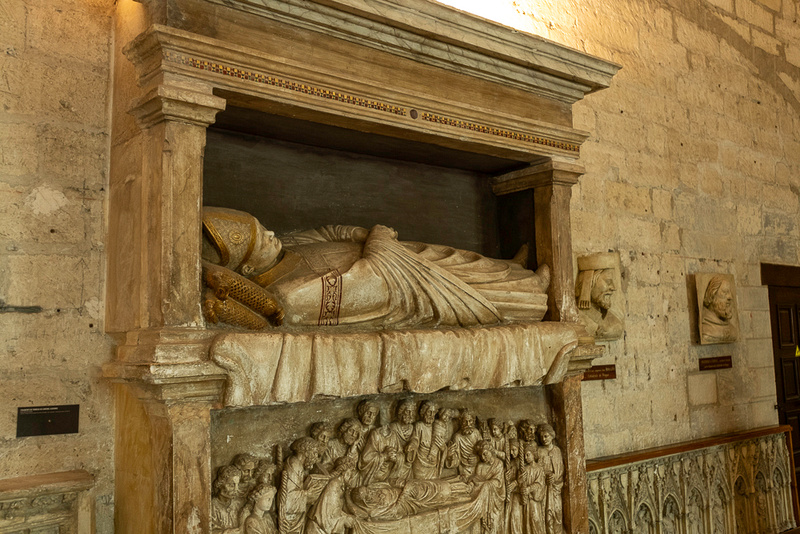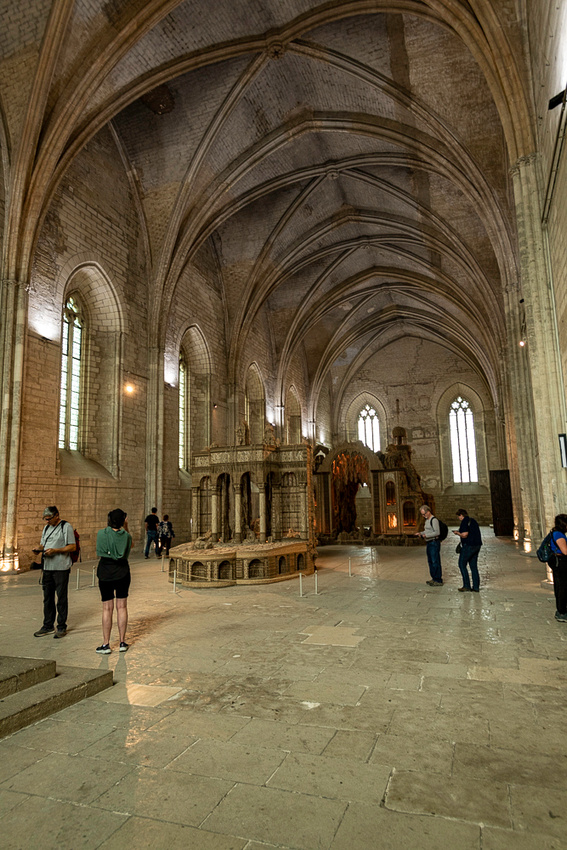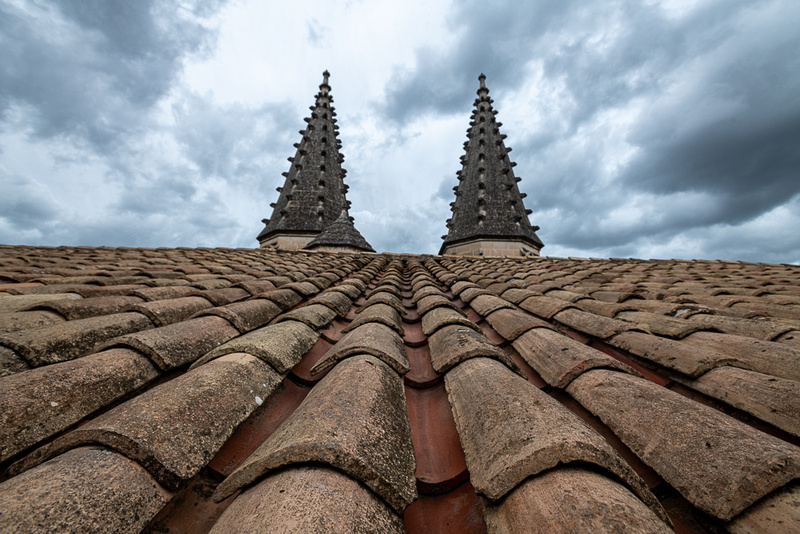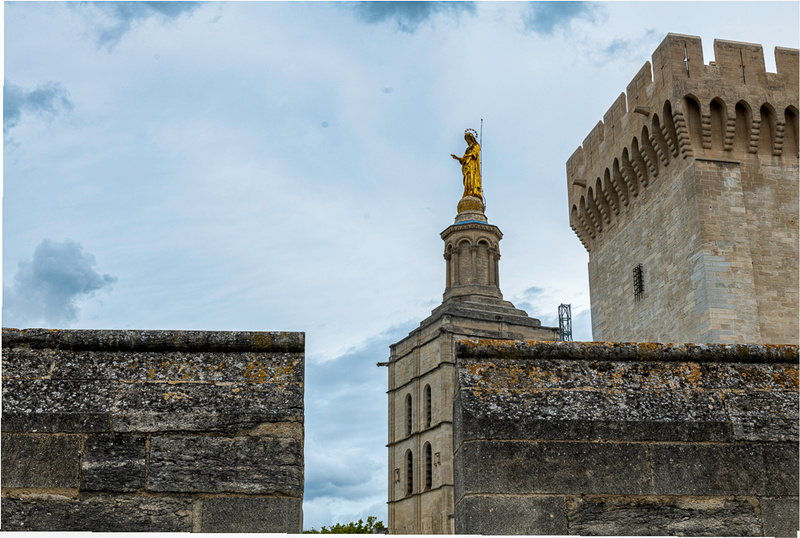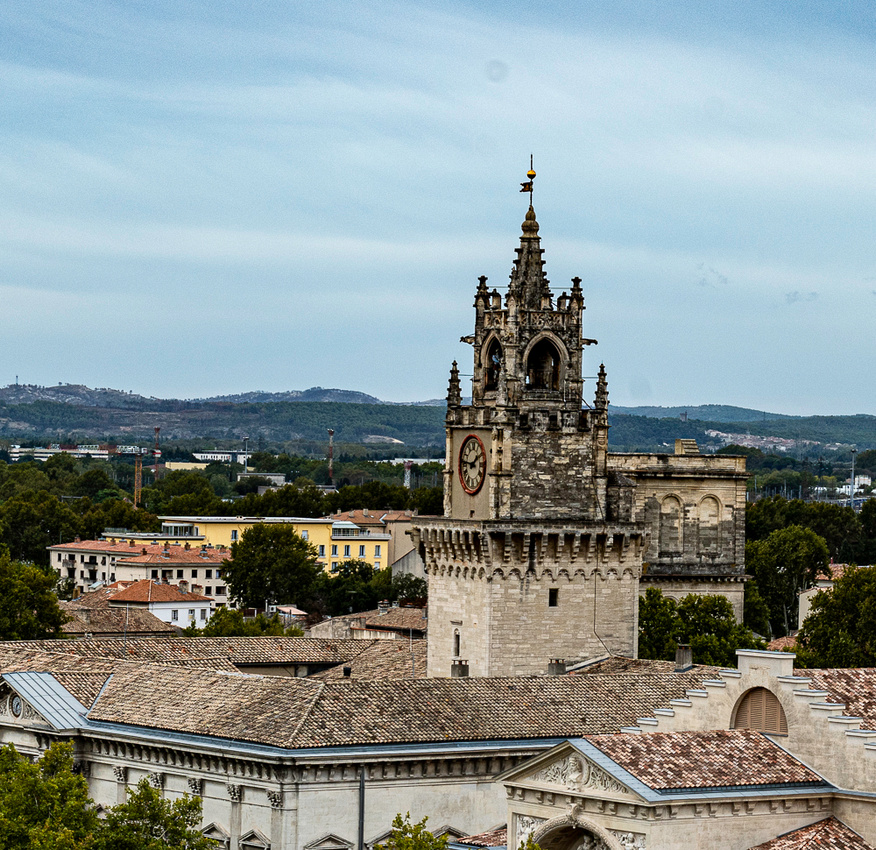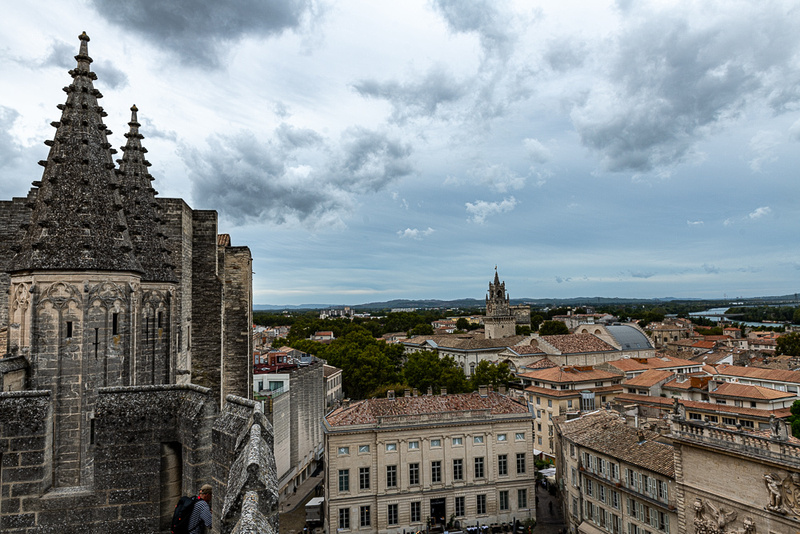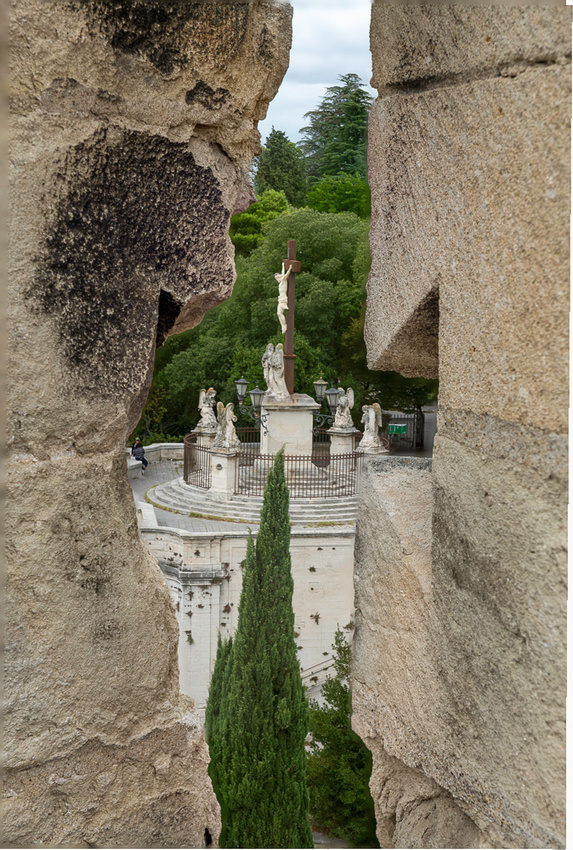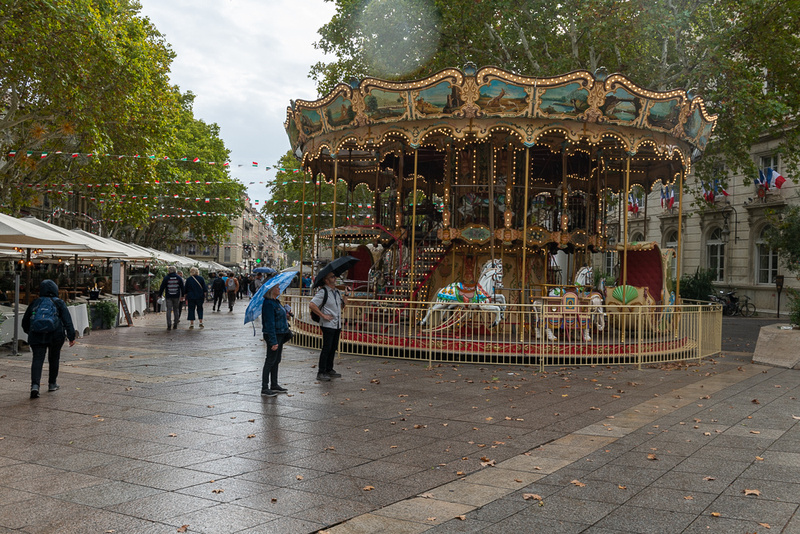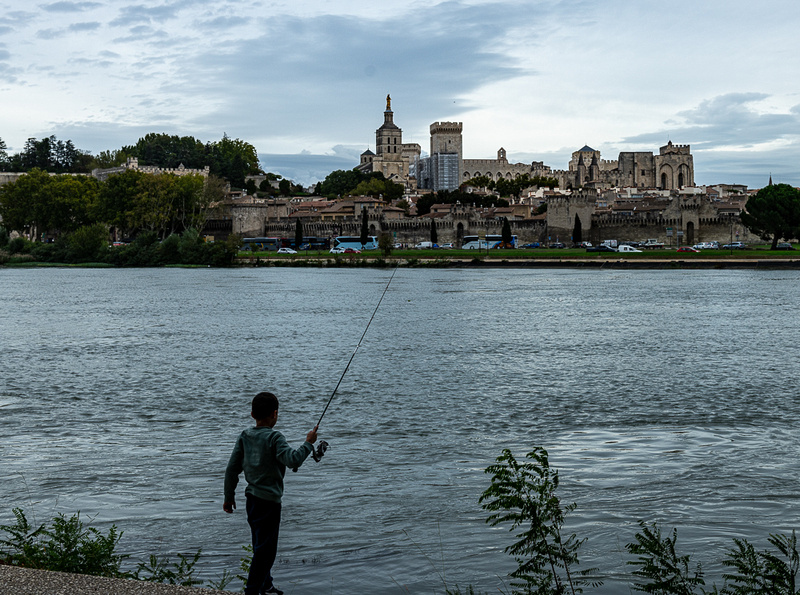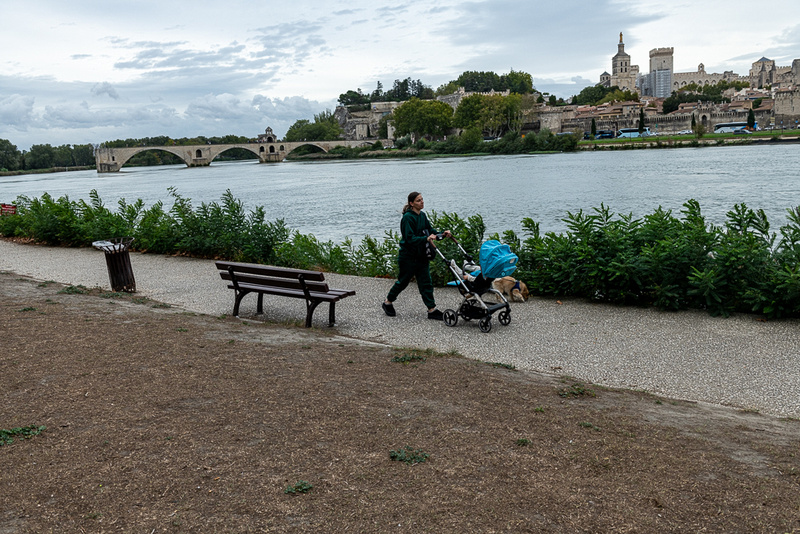Black Bulls and White Horses Part 3As the last bullfight was ending we slipped out of the stands and headed over to the south gate of the town wall. We knew that as soon as the final bullfight was over the bulls would be run back through town to the field where we started the day. When they come through the gate they will run straight down a long street and out the north gate. There were heavy steel barriers on both sides of the street. This might be something to see. When we got to the inside of the south gate there wasn't much of a crowd yet. I had a really good spot right next to another photographer but then I made a big rookie mistake. I wandered over to the barriers where Jeanne Marie was watching and didn't realize how fast the people from the arena would cram in here and how few of them would stay behind the barriers. I lost my good spot and was now jostling around with this mob of a couple of hundred insane people, trying to get a clear shot at just a few seconds of action. I say insane because once again we underestimated the level of risk they would take just for the fun of it. Two gentlemen in particular, both well into middle age, thought it was fun to stand right in the middle of the archway until they could hear the thunder of the hooves, and then run in front of the bull and horses to the sidelines. This of course did nothing for my pictures.
Below is a video of the first run of the bulls as they flashed by.
Again we were shaking our heads. We could hardly believe what we were seeing. Everyone wanted to touch the bull, especially his horns.
I finally got into position to get some clear shots.
Notice all the people in the background in the picture above. They are all inside the steel barriers which is about to lead to some interesting encounters. You see, the gardians have to guide the bull around this left turn through the archway. It didn't always go as planned.
"Ooops! What happened to my bull?" Mr. Bull didn't make the turn. Now he's out there with those three hundred people inside the barrier.
Below we get another bull that didn't make the turn. You can just see his tail disappearing past the arch. This time the consequences were not so benign.
The victim did get up and hobble off on his own steam. Three of the nine bulls got loose in the crowd. Below are pictures of the third. None of this seemed to persuade anyone to get behind the barriers.
So that was our excellent adventure in Aigues-Mortes. If you want to see more of the festival I've attached below some youtube videos. The first one has footage from the entire 11 days including the opening ceremony. The second one starts off slow but it picks up around the 5:50 mark. Then shortly after that point you will be seeing footage from the day we were there. The third one is from 2022. I think you will have to copy & paste the web address into your browser and they may open in the middle of the video. You can just scroll it back to the beginning. Check them out. They're fun. But we warn you, they are also quite addictive. And there are plenty more to be found online. Jeanne Marie made me include the picture below. That way I couldn't whine later that I didn't have any fun.
Only one more day for us in Provence. https://www.youtube.com/watch?v=iv2mF-BWzqg&list=PLpfTmBFH19HjSJOEdqKSw00DJWKcT8Cgm&index=3 https://www.youtube.com/watch?v=z8mAI-a2piw&list=PLpfTmBFH19HjSJOEdqKSw00DJWKcT8Cgm&index=1
Black Bulls and White Horses Part 2Now to the main event. As soon as the gardians rode into town we hustled down to the arena to get in on the "bullfight". The Camargue tradition of bullfighting involves challenging, not killing, the bull. A ribbon is placed between the bull's horns and the razuteurs, these are the French version of the matador, try to grab it. It makes for an interesting spectacle and I think you might agree, after seeing these pictures, that the bull has the advantage. The bullfights in the bigger towns are more formal. That is, the razuters are dressed in white and they have to be vetted before they are allowed to participate. In Aigues-Mortes it is more like a convention of rodeo clowns. Below are two of their finest. The haystacks in the background are supposed to serve as a safe spot where the bull can't get them. We shall see that this is an illusion. The rail fence the boys are sitting on is also an illusory barrier for the bull.
The arena itself is a temporary assemblage of large metal grandstands and private homemade boxes, some of which have been in families for generations. That's what you see pictured below.
The little kids are running around because we are between bullfight sets. There are three sets of three bullfights each. These children are practicing for the day when they, too, can run for their lives with a 1500 pound raging bull snorting down their necks. Below is a typical encounter. The razuteur has to get as close as he can but still make it back to the haystack.
Did I mention that in this contest the bull's horns are sheathed? So he can't gore you. That leaves only nine other ways to get killed doing this. Throughout this whole spectacle Jeanne Marie and I were constantly looking at each other asking, "Can you believe this? Are we seeing what we're seeing?" And it wasn't really the antics of the young men that had us slack jawed. In all cultures the young males need some way to burn off their excess testosterone. What amazed us was the casual way young and old, men and women, would hang around on that rail fence, casually talking, sipping a drink, sometimes not even watching the action, as if they were not involved. But they were. Many times the bull jumped over that fence and went after anyone who happened to be standing there. The young man below had not been taunting the bull at all but he got the full treatment. The bull hooked his horn on the kid's shirt and threw him over the fence. But then the lad got up, dusted himself off, and walked away triumphant. He had faced the bull.
Needless to say I took lots of pictures. My camera can do ten frames per second so it makes a little movie. Below are several slide shows each with a good stretch of action. The most aggressive bulls are saved for last and you can see this as the slide shows progress. The best ones are at the last three. In our next post we will be herding the bulls back out of town.
Black Bulls and White Horses Part 1Sunday Oct 22 This is the day the serendipity gods would serve up the juiciest of morsels. This was the kind of day one travels for, something totally exotic, unexpected, and delightful. We had been down to the Camargue earlier in the trip and got a tiny glimpse of this culture of black bulls and white horses. This day we would see it on full display. The cult of the bull across the Mediterranean region has very ancient, and very pagan, origins. Southern France is right in stride with this. Many towns have a statue of a revered champion displayed in a place of honor. The Camargue bulls are raised for bullfighting all over France, and the horses are for managing the bulls.
The event we witnessed is actually an eleven day festival put on by the breeders of the bulls. It had a very "small town, county fair" feel. There were not a lot of tourists and those few were from other places in Europe. We know this because it was all free, even to park our car. It was the Camargue celebrating itself. The main event is the Camargue style bullfighting where the bull is taunted, not killed. But there is much more to the day than that. So the remainder of this post will report on the preliminary activities. They alone were worth the trip. The day starts with breakfast. We were told to go to a field on the edge of town where we would see the gardians separate the bulls that would fight that day. When we arrived about 9 AM we found ourselves in the middle of a big tailgate party. Tables of cheese, champagne, French bread and pastries, people grilling, this is what they call breakfast!
We waited around for maybe 30 minutes wondering when something would actually happen. Finally they brought in a herd of bulls, moving them into a shallow pond. The gardians then rode up and faced the herd of bulls, just standing there for several minutes. What was this about? Were they saying a prayer? Saluting the adversary? It had a ritualistic feel to it. They then rode over to the fence where we were watching, dismounted, and went back to the party.
Not having brought provisions of our own (we'll know better next time) we could only wait and watch them eat. Finally they got to it, separating the bulls they wanted for the bullfight.
As the bulls were picked out they were herded down a country lane, through the north gate of Aigues-Mortes, down the city streets to the south gate, and into the arena. This all happened before we could get in position to get pictures. We did get these gardians bringing up the rear.
Next, the bullfights!! Nimes and Uzes Medevial FestivalFri Oct 20 Another day another fabulous Roman amphitheater. Nimes was the Roman provincial headquarters so it had a really nice one. Like the one in Arles, it is still used today. The French Army was having some kind of ceremony when we got there. It gave the pictures a nice touch.
But wait, there's more! Nimes also has a first century temple built by Caesar Augustus. It is the best preserved Roman temple in existence.
Below is a stand of the famous Provence sycamores. They line the streets and roads everywhere. The drive back to Uzes had several fine examples.
On Saturday Oct 21 we took a down day, staying in Uzes and checking out their Medieval Festival.
Tomorrow, Sunday, we will head back down to the Carmague, where the serendipity photo gods have kept the best for last. Avignon Part 2Thurs October 19. Okay, I promised to take you through the Pope's palace in Avignon. And what, you might be asking, is the Pope doing in Avignon? There were multiple reasons this happened but suffice to say that the French kings in the 14th Century were very keen to dominate and control the papacy. Seven popes served here and all of them were French. I will admit that I was rather underwhelmed by the furnishings. I guess having been through the Vatican in Rome I expected something more opulent. But then it occurred to me that in 1309 the Renaissance hadn't even started in Italy and wouldn't reach France for over a hundred years. And Avignon was in no way ready to be the seat of what was, effectively, the court of a major prince. All of the bureaucrats, lawyers, ambassadors, and sundry hangers on needed facilities for them to do what they do and it all had to be built from scratch. What they built is impressive but about the time they got to the decorating part, the Pope went back to Rome. It is a piece of history though so interesting to us.
First stop were the gardens.
Then in typical palace tour fashion we went from one room to the next and tried to picture business going on as usual.
Below are two rooms that got their finishing touches. They are frescoes and some of the most vibrant we've ever seen.
Then there was the crypt. All seven Avignon popes were buried in or near the city but not all in this crypt.
So now for the view from the roof.
On the way out of town we stopped at an island in the Rhone that gave us a nice view of the town. Wish the light had been better.
|
